#this movie respects its audience's intelligence
Explore tagged Tumblr posts
Text
Nuance, Narratives, and Nosferatu
As of today, Robert Eggers' Nosferatu (2024) has only been in theatres for 4 full days; and, coincidentally, that is about as long as I am able to let my thoughts marinate before they demand to be communicated. Before going into any further detail, let it be known that this film was made by freaks for freaks; it exists for the goths, the gays, the monsterfuckers, the historians, and for all those who delight in moral and thematic complexity.
With that being said - spoilers under the cut!
There are two principal narratives running through the flesh of Nosferatu, both of them rooted heavily in the cultural and literary origins of the story. It is a nightmare; it is also an erotic fantasy. It is horrifying, and it is also achingly romantic. From what I've seen so far, the vast majority of discourse that has already emerged around the film is caused by people misunderstanding or deliberately ignoring the relationship between these different lines of analysis; so please trust me when I say, from the bottom of my heart, that this duality is the very lifeblood of the movie.
The reason for that is, quite simply, that Nosferatu is a gothic horror film, set in 1830s German Confederation; and its plot relies on the same (sometimes contradictory) complexities often displayed in Victorian gothic fiction.
From the beginning of the movie, we are given to understand that Ellen Hutter met Count Orlok - the eponymous nosferatu - psychically, when she was very young. They spoke, she pledged herself to him, and was horrified to realize what she had done when he revealed his true visage to her in their first visual (and sexual) encounter.
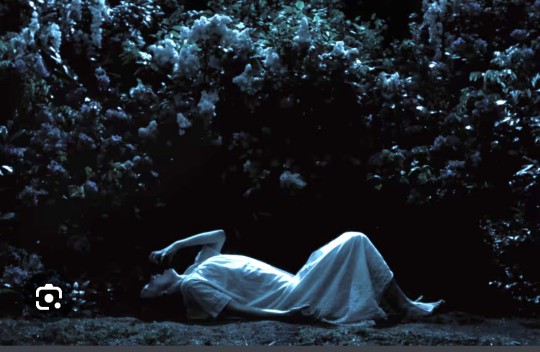
Here, under the lilacs, the paths diverge.
The first reading of the film is perhaps the more straightforward. A young girl is essentially catfished and groomed by a much older, dangerous man. When they meet for the first time, she is a teenager; the lilacs that bloom where it happens become a trigger. He is the source of her madness and "melancholy" (depression), she has nightmares about him regularly enough that her husband is aware of them, and it is implied that she has been institutionalized in the past. Thomas Hutter is the physical representation of her one desperate hope for a normal life - but as the story progresses, she finds herself being denied even that. Orlok's psychic connection with her verges on demonic possession; in chilling, The Exorcist-inspired sequences, she writhes and mutters, prophesying a city-wide reign of death and terror. In pursuit of his claim on Ellen, Orlok terrorizes her husband, murders her friends - and, eventually, she gives her life to take him with her to the grave, saving the city from the plague he caused.
That is the horror element of Nosferatu; it deals with an exploration of childhood trauma, of PTSD, of difficulties maintaining a social life after the fact. It is easy to understand even from a modern viewpoint, and it pushes the film to its conclusion with a bleak, heart-wrenching punch.
The horror is not the only element of Nosferatu.
To contextualize the alternate - though just as correct - reading of the film, it is essential to understand that Ellen’s society was extremely sexually repressed, especially in regards to female and queer sexuality.
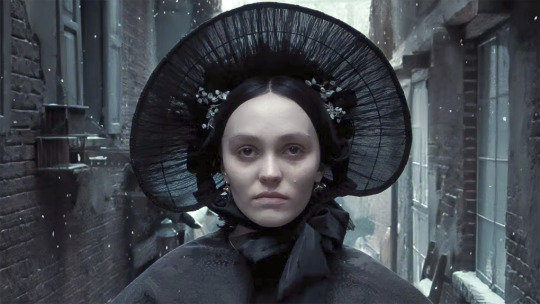
Both were severely medicalized, demonized, and restricted; and as such, when these topics do make an appearance in contemporary fiction, they are often inextricable from disgust and fear.
Dedicated as always to historical accuracy, Eggers maintains the same setting-based narrative coding.
In anticipation of morality arguments vis à vis monstrosity, depiction, and modern purity culture, let me clarify: this is something that works within his chosen genre. Horror, and especially gothic horror, invites a deeper analysis in regard to morality and motivation, and in this case, Eggers' homage to the origins of that genre grounds the narrative in its time and location, as well as fleshing it out much further than a purely modern cultural lens would permit. In this context, the details of Ellen's connection with Orlok become paramount to the understanding of the film.
As bits and pieces of their background become revealed, the audience realizes that her psychic gift did not begin with him - and neither did her melancholy, or her isolation. She was born with her abilities, and throughout her childhood, she was a bit of a tomboy by her contemporary standards, running wild in the woods near her father's property; however, once she foretold her mother's death, and once she was too old to get away with eccentricities, her father became frightened of her abnormality. She was isolated, confined indoors, and that is when her melancholy had begun. Painfully lonely and aching for some form of companionship, she called out into the ether; and Orlok responded.
Over the course of their story, he becomes the physical manifestation of everything Ellen perceives as dark and sinful about herself.
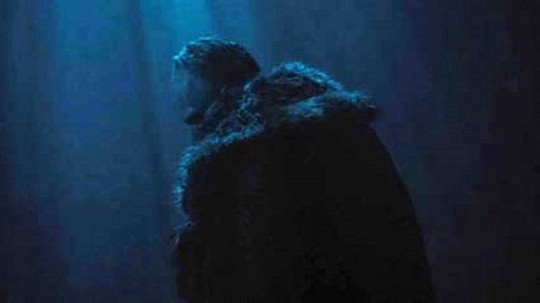
He is psychic, he is vicious, possessive, and blatantly sexual; her sensual affection with Anna parallels the evident and physical attraction he displays towards Thomas; and the social power he so easily commands is the same that she lacks, being a woman in a rigidly patriarchal society.
In the end, the severely questionable age gap, the murders, the coercion, the betrayal - all of that comes down to respect. Throughout the film, that is the one thing that Ellen is consistently denied. She is young when she meets Orlok, yes; but she is aggressively infantilized by her surrounding society even when she is a grown, adult, married woman.
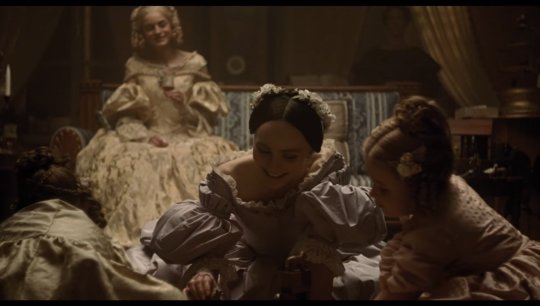
It starts from the beginning of the film, when the Hutters visit the Harding family. During those scenes, the men are shown talking business - while the women play with children in the parlour; and the same social framing persists into the body of the film. When Ellen is suffering from what appears to be some form of mental illness, she is referred to as a child by multiple different characters; and when the condition progresses, she is swiftly diagnosed with hysteria and drugged - thus being forcibly removed from the discussion of her own illness. The general reactions to that illness - which is, in fact, a display of her psychic abilities - range from annoyance to fear to curiosity; it is seen either as a disability or a curse, rather than anything entirely innate to who she is. Her fears are dismissed. Harding tells her to learn some deference. Even closer to the finale, when Von Franz admits that she could have been a great priestess in another age, he does so with pity rather than anything else; in their industrial era, he cannot help but see her only as a tragic sacrifice - horrible, but necessary to save the city from a plague. Brought in to heal her, he instead guides her to her death.
All these aspects of Ellen's circumstances find a direct opposite in her relationship with Orlok. Unlike all other characters in the film, he only ever sees her as his equal, which is made even more evident when his interactions with Thomas and Herr Knock are brought into consideration. With both men, Orlok insists on being addressed by his lordly title, "as his blood demands it"; and yet, Ellen never calls him by any title at all, be it "My Lord" or even a simple "Herr." She argues with him freely, and there is a familiarity between them that he is demonstrated to never tolerate from anyone else. Similarly, while he disguises the covenant he makes with Thomas, the terms of his covenant with Ellen are laid out clearly, in full. He does not hide from her; she already knows the worst of him, the same way he knows that she is intelligent, that she is powerful, and that she is not meant to be demure and deferring. Again and again, Orlok insists that Ellen is not meant for humanity - and the true horror, the horror she cannot bring herself to face, is that he is right.
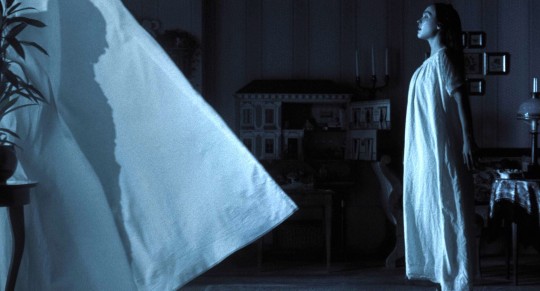
In a sense, he is a mirror held up in front of her own face. Ellen is painfully aware that she does not fit in, and that she never has. The "normal" society, epitomized by the Hardings (wealthy husband, pretty blonde wife, 2.5 kids), has no place for her - and actively dislikes her.
The film makes this ostracism impossible for the viewer to ignore. As the story progresses, it becomes evident that the other human characters - even those that do sincerely care for Ellen - never truly know her. Anna loves her, but wishes she would not talk of dreadful things - and lashes out as a result of that discomfort, scolding her. Sievers finds himself bewildered by her; Knock sees her as an object to trade; Von Franz pities her, Harding hates her, and Thomas cannot truly satisfy her, even after being touched by the supernatural himself.
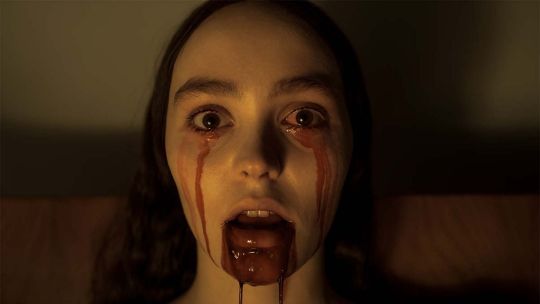
Seeing a flash of a monstrous face while they are together, he flings her away. To him, his experience with Orlok is merely traumatic, and he wishes for nothing more than to leave it behind. However, to her, it is something she cannot help but crave; and she continues to wear her lilac perfume.*
All that to say - Count Orlok is, simultaneously, everything Ellen wants and everything she is terrified of being.
That specific dichotomy reaches its climax during their mutual finale. As it is to be expected from a vampire wedding night, they rejoin in a sequence of sex, blood, and renewed vows - and what is particularly notable is that (unlike Murnau) Eggers makes it clear that this Orlok never intended to kill his Ellen, despite his inability to resist her blood. Though he drinks from her through the night, he stops at cock-crow; and she guides his head back down herself, distracting him long enough for the sun to rise. It is a duet of accident and intention. He drains her; and she holds him as the sun drains him. They cling together as they end - on a bed that serves their wedding and their death.
It is romantic. it is unquestionably romantic. However, that does not mean that the horror isn't also present; Ellen's consent, under these circumstances, is highly debatable, and Orlok is cruel, amoral, and murderously possessive. At the same time, the characters are also acting out folkloric archetypes, with precious little adjustment to that framework - which further removes them from a modern understanding of morality. He is Death, a Koschei the Deathless, a monster; she is the Maiden, a Vasilisa, a damsel. I hesitate to liken them to the Beauty and the Beast, largely because in the original premise of that story, the Beauty falls in love with the kindness that the Beast consistently displays; and it is essential to stress that Orlok has none. He does care for Ellen, in his own way, but he admits to being incapable of love as she defines it in human terms;** and, curiously, that seems to be her primary concern when it comes to the idea of accepting his proposal - rather than all the blood and carnage.
What I'm trying to say, I suppose, is that there are multiple ways of following a story, and multiple different stories in a film as nuanced as Nosferatu. Yes, it is about grooming and trauma. Yes, it is about finding love outside of the cage that is "polite society." I'm sure that it is many other things besides, with as many meanings as there are people in the theatres; after all, I am only one person, and the film grossed something over $40M in its first three days. The point is, really, that this is a story in which a rotting vampire is woken from centuries of deathlike slumber by a lonely voice asking him to be her friend; and whatever these two strange and aching souls do with that can go down any myriad of paths. The film trusts the viewer to interpret the narrative they choose.
* LILAC PERFUME - in fact, it is such a consistent favourite of Ellen's that Orlok smells it on her hair in the locket she sends with Thomas to the castle. Thomas never really learns the reason she likes that scent - even though he knows that preference well enough that he gifts her lilacs in the beginning of the film.
** ORLOK'S OBSESSION - this is a side note, but: the vampire wedding sequence reminds me strongly of the third season of NBC's Hannibal. I suppose that was to be expected, considering that Hannibal is also a Dracula offshoot, much like Orlok himself. When Ellen snaps at Orlok that he cannot love, he responds that "no; but only with you, I can be truly sated." Similarly - "Is Hannibal in love with me?" asks Will; and Bedelia responds - "Could he feel a daily stab of hunger for you, and find nourishment at the very sight of you?" I'd say if you liked that series, you should try and see the film. It works with a familiar blend of aesthetic horror.
#nosferatu#nosferatu 2024#robert eggers#lily rose depp#bill skarsgård#nicholas hoult#nosferatu spoilers#nosferatu analysis#nosferatu movie#willem dafoe#nosferatu meta#gothic horror#horror#horror film analysis#this movie respects its audience's intelligence#and that is everything to me#it doesn't spoon-feed you. it doesn't cave to over-explanation#it allows you to do the analysis yourself and read into the details#everyone say thank you robert eggers
1K notes
·
View notes
Text
youtube
Got linked to these very good videos recently on all the fake branding around "No CGI" and "Practical effects" in big budget movies today - as is no shock to anyone virtually every single claim of "no CGI" in a movie today is just a complete lie (Oppenheimer is the only debatable exception). Jonas is a very good presenter, he respects your intelligence and has a breadth of cinema knowledge that makes this series more than its headline.
Something that I thought was interesting that he alluded to was a cool industry shift that has occurred around the ease of special effects meaning that people involved don't even know they are happening. If you were an actor in a movie in ~2010, and a shot was a "VFX" shot, you would see greenscreens/bluescreens, you would see rigging equipment, you would maybe wear a mocap suit or tracers or something. You yourself had VFX skills, you were part of the project. And audiences learned that too, they learned to expect to see bluescreens or behind-the-scenes footage of those things.
But that is increasingly outdated now - still used for ease or specific shots, sure, but its not necessary. You can completely redo the backgrounds, build rig models for actors, clone objects from the frame, and so on just from the native footage, the tech is that good. So you will sometimes shoot a scene and it will look normal to you, and then be changed in post, you don't even know. At one point he tangents to discuss how marketers will lie about the actors "doing their own stunts", which seems credible to audiences because they know that for stunts you do things like hiding the actor's face or having specific cuts to mask the actor switch. But they don't have to do that anymore! You can just composite the actor's face onto the body of the stunt double, and you don't notice. That old "trick" you had to tell isn't functional, and being used *against* you.
It really reminds me of Dan Olsen's idea of "Bakshi's Vision", where the distinction between an animated film and a live action film becomes too blurry even bother with. Obviously that won't become literally true, but you can see the shape of it more and more.
240 notes
·
View notes
Text
ive already talked about my deep rooted hatred for the light furys character design, which im sure many people would agree with
what might be a more controversial opinion however, is that toothless honestly doesn't look much better in the 3rd movie...
ive joked in comment sections before that the changes in character design for toothless from movie 1 to 3 resemble the evolution of wolves to pugs due to selective breeding to make them 'cuter'.... but bro.... its really not a joke...




(i even chose 2 photos where they're in a similar position so i can be fair)
i adore the original toothless design. he looks majestic and still maneges to look like a real animal that could possibly exist in a fantasy setting. kind of ironic that back when he looked the most animalistic was when he behaved the least like an actual dog... he was cautious, curious, and most importantly... had dignity
meanwhile in the 3rd movie it seems they moved his eyes closer together, made his forehead significantly larger, made his eyebrow bones a lot more pronounced and dulled his coloring from a very dark, almost black blue, to a washed out grey.
not to mention his behavior. he seems to have UNdeveloped his intelligence, actually more like and over excitable dumb dog than ever before. he lost all his mysterious elegance and dignity, and turned into something the 5 year olds in the audience can point and giggle at "look mommy! look at the silly dragon hop around!"
basically, he went from a uniquely designed well thought out character that the creators very clearly loved and had respect for, to basically a walking merchandise advertisement. he looks like a toy, because they wanted to sell toys of him
what REALLY grinds my gears however, is the fans who try to justify these awful creative decisions by saying things like "night furies loose their markings as the grow older!" "he looks like that because hes older now!" "everyone changes as they grow older! why shouldn't he?" as if... night furies.... ACTUALLY EXIST. like they're real animals that we can observe to change in such ways with age. as if this is not a species completely made up by the httyd creators, MEANING they also came up with ALL of the changes he went through for movie 3. the only reason "night furies change with age like this" is because THEY said so... because they made the CHOICE to change him like that and needed a justification when people rightfully called it ugly.
people need to be able to not just take media at face value, and ALWAYS take into account the actual real people who came up with all of it, and WHY they made said media the way they did.
#phew i didn't know i had all this in me...#felt good to finally type it all out tho#httyd#how to train your dragon#toothless#toothless httyd#anti httyd 3#anti how to train your dragon 3#httyd thw#anti the hidden world#httyd 3#i have so many problems with this movie i could write a novel about it#truely believe everything after rtte is either kinda mid (httyd 2) or awful (pretty much everything else)#cant speak for the comics tho since i havent read them yet but i plan to
34 notes
·
View notes
Note
My Pride is weird bc the gore for shock value is really the only thing "adult" about it. As far as plot and characters and themes it fits right in with YA xenofiction - yes, even "mature themes" like abuse and oppression are often covered in children's media like Wings of Fire and AtLA, that's not exclusive to adults. I feel like MP was actually intended for the same type of audience, but they added the unserious bobblehead disclaimers at the last minute bc they realized angry parents might come after them if their kids watched a Lion King-style YouTube video that turned out to be super violent and bloody.
Its really hard to tell who the audience for MP was outside of "people who were already fans of Tribble's warrior cat/cotw content". Can't be for children, cuz there's warnings (well "warnings" in the form of cute widdle bobbleheads with little fun quips from the characters)
Like is this for teens? I mean I know teens like a lot of crappy stuff (not me tho, I've always had impeccable taste /sarcasm)
Is this for adults? Cuz the messaging and writing is almost unfathomably immature. The messaging was so bad, people still don't understand what's so "problematic" about it. They think RJ and I are just mad because ableism and homophobia is in it. Like why do we have to keep explaining things to people. If people used their brains, or consumed literally anything else, they'd arrive to the conclusion themselves. After all a ton of the opinions we expressed in our video were already expressed by lots of other people beforehand and they didn't need us to tell them what to think lol
Even the violence was immature, which I can say because I love me some creative violence in my movies/shows. There's science behind violence, so you'd think a show that prides itself as being a "more mature Lion King" and believing itself to have a more realistic portrayal of lions, it would have realistic violence, but nope.
The violence in this show is sometimes hilariously censored, like for some reason Barkmane's body was completely blurred out when they had no qualms about showing Starmane and Quickmane's body, their injuries were not even indicative to anything based in reality
Karabi's throat was slashed open and her voice actor was just groaning (not the voice actor's fault, this is the fault of the director) and I dunno, I feel like I've seen enough slasher films to know a convincing dying noise when I hear one, but I don't expect people working for me to know what that sounds like so as a director it would be my responsibility to... you know... direct.
And Sharptongue's death, like I still don't know what was supposed to even be wrong with her. She just started having a coughing fit and died off-screen.
AND YET MP somehow manages to be really fucked up in its mediocrity?? Because it just shrugs off child death like the characters do. And Tangle's death was used for a joke.
It's not like resources aren't out there, people have been posting videos of lions killing each other on youtube for years lol
"Adult shows" that are easily outshined by kids shows in maturity are fascinating to me, and they're more commonplace and I don't know why. At least two other "adult shows" have so little respect for the intelligence of their audience that they put in a shit ton of information that adults get mad when they have to think about things. And/or they are so embarrassingly safe it's almost like they're made specifically to cater to kids.
I mean the fuckin Lion King straight-to-video sequel had an effective abusive family dynamic, so what's the excuse here exactly. (I mean I know the answer, it's because Tribble pulled heavily from Warrior Cats and didn't improve upon it.) - Cat
42 notes
·
View notes
Text
I watched Ridley Scott's NAPOLEON yesterday and it was a complete Waterloo.
Yes, I am a big history nerd with a giant heart for movie adaptation of historical topics. But when I watched NAPOLEON I sat there... and tried not to laugh. It was not only so historical inaccurate, that I wanted to cry, at the same time it was filled with cringe dialogues, red flags and terrible color grading. This whole movie made me so sad yet so angry, that I HAVE to write this review:
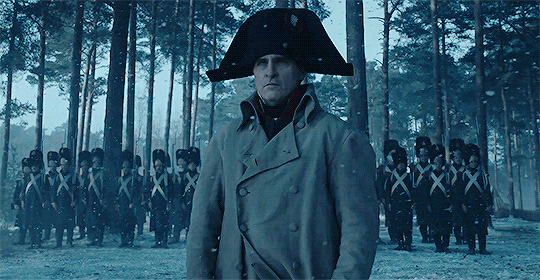
(Disclaimer: This review is based on my own opinion. If you enjoyed the movie, it's completely fine. Btw. in that case or if you agree with me, feel free to tell me your opinion. I would love to know!)
First of all: Don't get me wrong, the medium film has its own rules and you can't put as much historical accuracy into a big scale movie as you would into a documentary - sometimes the story needs to be altered to be a good movie. And that is fine. Even if Gladiator is a complete fictional story set in the Roman Empire, I can still enjoy this movie for what it is: A good-written story with great characters, a beautiful score and iconic scenes. With Kingdom of Heaven it's kind of the same - and while the movie cut was very inconsistent, I still kind of liked it. But then the Directors Cut made it a a masterpiece for me.
Funny enough, both of these movies are made by the same person: Ridley Scott. So naturally I thought: Well, Napoleon won't be a historical accurate film, but I surely will enjoy it anyways. Well, ...no. It is not only historical incorrect, it's also a bad movie overall.
To start it short: NAPOLEON clearly lost itself in all the various topics it wanted to tell within a runtime of two and a half hours. It made the whole storytelling very weird and inconsistent, causing the problem, that the audience even loses itself in the questions of when and where. Where is that scene located? When did that happen? And then comes the question: Why is this even happening?
Ridley Scott wants to depict Napoleon as a lover, a military genius, a big political figure, a revolutionary and more. But in the end he tells all of this in the most shallow way possible, which waters down Napoleons personality traits and achievements to a series of small scenes. You never get a glimpse of the "true" Napoleon, who was described as a highly intelligent and charismatic man. In fact, you never really feel ANYTHING about him except that he was a cringe red flag in front of his wife. He just stands there, stares and has very limited dialogue scenes to get a picture of that man. What are his overall motivations? Only Josephine? If so, why is this motivation only vaguely explored?
The whole love story between him and Josephine feels so unnatural and got to the brink of being disgusting. This is particularly sad because I deeply respect Vanessa Kirby and Joaquin Phoenix, they're both stunning actors. I don't know if they just couldn't fit the role or if it was rather a problem of the script (the last one is my guess). Yet whenever I saw Josephine and Napoleon on screen, I felt like acted very stiff and forced. Napoleon seemed more obsessed with her than actual love and that can be a character trait, but there wasn't a chance to explore that deeper. Before the movie entered the cinema, the lovestory between these two was marketed as intense, obsessive, deeper than you could imagine. What the audience got was a few scenes without real conversation, much staring and a bunch of cringeworthy s-scenes. And seriously, these "sexy" scene were the worst. I was so disgusted by them because they were SO DAMN WEIRD. There are no scenes that undermine ANY deep love between Josephine and Napoleon. It felt therefore so off, when they still longed for each other after their divorce.
And let's not start to ramble about the fact that they depicted Josephine ONLY in a somehow sexual way. Yeah, there is that scene where she says to Napoleon, that he is nothing without her. BUT SHOW, DON´T TELL! You never see her doing something instead of sitting there, talking with others or when the plot needs her to have sexy time with someone (not only Napoleon). As a woman myself this makes me so freaking furious, you have no idea. I don't need a marvel-coded super-strong woman with unlimited talents - I just need a female character that is written GOOD and plausible! Make me CARE for her plot and for the plot of Napoleon! Both of them don't even feel like normal human beings because they're like blank pieces of paper with their names written on it!
And don´t make me start to talk about the historical inaccuracies. At first I didn't want to draw that card. Actually, I don't need a historical movie to present 100% facts. If the movie is still enjoyable, it's okey. But even if many people say that the war scenes were awesome, I can only partly agree. Yeah, we have that cool ice-lake Austerlitz battle, but it took me a couple of minutes and a better look on the uniforms to know that Napoleon is now at war with Austria! You get nearly ZERO context to Napoleons battles. Yeah, nice, the scenes look cool - but there is nothing more to it? Is that all you need to show for the audience to care? For me at least, I just didn't care at all and I was very happy when I got out of the cinema. Overall this movie is full of messy non-sense choices that don't contribute to the story. Many moments just confused me and it left me with the question why Scott couldn't simply hire some historians to put together a consistent story. Everyone who read about Napoleons life knows that there are so much cinema worthy moments in his career that would've been so much better than what we now got.
I could ramble about that movie for hours if I´m honest, but I hope this little TED talk was enough to make my statement clear.
In the end, it just makes me sad. I wanted to like this movie, I wanted it to be good. For months I hyped myself up to this, read books about Napoleon, watched the trailer all over and over and talked with friends about how great this movie will be. Now I am just disappointed and frustrated. Oppenheimer was such a great biopic of a historical person that became a great success at the box office - even without great battle scenes. I hoped that Napoleon would push a cinema revolution, that shows people want big scaled films about historical personalities and history topics. But now I just want to forget this Napoleon movie to be honest.
147 notes
·
View notes
Text
I’ve been playing Immortality (2022) and I’m obsessed with the nuance it manages to hold and how it successfully threads the needle on fairly specific and complex topics while the story itself is so entirely nonlinear. The gameplay style of sorting through randomized clips ensures that the developers have fairly little control over what order the player finds the scenes in. So the story has to work in every possible order, and it somehow does!
I’m not finished with it yet. I have no idea how far I am in the game lol. But like six hours in, at least, I’m really intrigued by the way it delves into art as a concept; is it consuming, is it fulfilling, is it worth the sacrifices made to create it, or the social evils that can surround it, etc. I particularly like that the three fictional films it centers on are interesting but simultaneously fairly low brow.
I’m also enjoying the way it gets into women’s role in art, and the gendered constraints of how they are historically portrayed within a narrative (often by men) but also when it comes to being an artist and the questions of exploitative practices, and lack of respect or recognition.
And the game actually employs its immortal, unaging protagonist in a way that intelligently explores these themes.
There’s something really interesting happening with her three main film roles and how her first character (literally Matilda from the Monk by MG Lewis) is basically an entirely stylized fantasy. A destructive and seductive force of nature, with no interiority of her own, who only exists to corrupt the titular monk. Then her second character is a standard femme fatale, a model who kills her artist lover and again… corrupts the strait laced and moral detective protagonist who’s trying to solve the murder. This character is explicitly acknowledged to be a more grounded and real role, she’s closer to a real, flawed person, but she’s still basically a vector for titillation and is vilified for it. By the third (dual) role, decades later, she’s progressed to being a genuine protagonist. But for that, her character is split into a very literalized virgin and whore dichotomy. These sides are symbolically fused by the third act of this fictional movie with the virginal character’s death, with the whore stepping into her place and finally becoming a fully realized person. But even that comes with the deliberate framing of something unachievable without a death and rebirth occurring. Without her being sanded down to a sort of palatability by it.
I’m also very interested in these films being in-universe lost media that was never actually completed or widely released. And how that may tie into its themes of recognition and the importance or lack thereof of having an audience.
#this game reminds me a lot of basically everything addie larue failed to do#immortality (2022)#immortality game#video games#dark stories of the north
52 notes
·
View notes
Text
Rediscovering 10 Things I Hate About You: A Timeless Blend of Shakespeare, '90s Rebellion, And Romantic Realism
When 10 Things I Hate About You hit theaters in 1999, it was easy to assume it was just another teen romantic comedy, following in the footsteps of classics like Clueless and She's All That. But as the years have passed, the film has aged with surprising grace, managing to maintain its relevance and endearing itself to new generations. This beloved high school rom-com not only entertained but also tackled themes of independence, feminism, and individuality—all packaged in the grungy, rebellious spirit of the late '90s. Let’s dive deeper into what makes this film more than just a teenage love story and why it still resonates with audiences over two decades later.
1. Shakespeare For The TRL Generation
At its core, 10 Things I Hate About You is a modern retelling of William Shakespeare’s The Taming of the Shrew. For those familiar with the original play, Shakespeare’s work explored themes of control, submission, and transformation within relationships, all of which can be problematic through a modern lens. 10 Things flips this on its head by allowing its characters—particularly the fiery, independent Kat Stratford—to resist the narrative’s traditional expectations. This Shakespearean foundation gives the film a richness that transcends the typical high school romance, grounding it in the literary tradition while modernizing its themes to appeal to the rebellious '90s generation. By transforming Kat into a symbol of self-respect and autonomy, the film simultaneously honors and subverts Shakespeare's intentions, making his work accessible and relevant to a young audience.
2. Kat Stratford: The Unapologetic Feminist Heroine We Needed
Kat Stratford, portrayed by Julia Stiles, isn’t your typical teen rom-com protagonist. She’s opinionated, fiercely intelligent, and unafraid to stand up for what she believes in, which—unpopular as it may be in her high school environment—includes her right to be unapologetically herself. Kat rejects the high school social hierarchy and refuses to play along with gendered expectations. For many viewers, particularly young women, Kat was a revelation. She showed that it was okay to be "difficult," to demand respect, and to live life on one's own terms, even if it meant breaking societal norms. While many female characters in '90s cinema were defined by their quest for romantic fulfillment, Kat was refreshingly self-assured and uninterested in pandering to male validation.
3. Patrick Verona: The Anti-Prince Charming
Enter Patrick Verona, Heath Ledger’s breakout role. While Patrick may have started as a typical “bad boy,” Ledger’s portrayal gave him layers that took him far beyond that trope. Unlike traditional romantic heroes, Patrick wasn’t there to save or tame Kat but instead grew to understand, respect, and fall in love with her for exactly who she was. Their relationship was based on mutual respect and genuine attraction rather than a “change for love” narrative. Patrick doesn’t ask Kat to compromise her beliefs, and she doesn’t ask him to become the “perfect boyfriend.” Their connection highlights the beauty of imperfect, real love over idealized romance, making it more grounded and authentic than most teen movies of its time.
4. Tackling Social Pressures And Sibling Dynamics
One of the film’s underlying strengths lies in its portrayal of sibling dynamics and the social pressures teens face. The contrasting personalities of Kat and her sister Bianca highlight the pressures young women often experience to conform. Bianca initially represents the stereotypical high school “it girl” while Kat stands in opposition. But the film delicately peels back these stereotypes, revealing Bianca's insecurities and Kat’s vulnerabilities. Through their growth and reconciliation, 10 Things reminds us of the importance of understanding and accepting loved ones, even when they embody different aspects of ourselves. This nuanced portrayal of sibling relationships is a refreshing break from the often oversimplified family dynamics found in teen movies.
5. Why 10 Things I Hate About You Still Resonates
The film’s success in transcending its genre lies in its ability to strike a balance between humor and heartfelt emotion. From Kat’s famous poem confessing her feelings to Patrick’s mischievous serenade in the bleachers, these moments capture the raw emotions of young love without resorting to melodrama. Rather than promising "happily ever after," the film ends with an open, realistic view of relationships, suggesting that love, respect, and personal growth are ongoing journeys.
10 Things I Hate About You continues to resonate with modern audiences because its characters are real, flawed, and authentic. Kat’s independence, Patrick’s vulnerability, and the complicated world they navigate still speak to viewers who see themselves in the characters’ struggles and triumphs. And while it may be set in a different era, its core messages—of staying true to oneself, embracing imperfections, and finding genuine connection—remain timeless.
Final Thoughts: A Film For Every Generation
In a world of idealized romance and neatly packaged endings, 10 Things I Hate About You remains refreshingly honest. It celebrates the messy, often frustrating journey of self-discovery, the highs and lows of teenage love, and the beauty of accepting others as they are. In doing so, it has established itself as more than just a teen movie; it’s a story about empowerment, acceptance, and the joy of authenticity. Whether you’re watching it for the first time or the fiftieth, 10 Things I Hate About You reminds us that, sometimes, the things we hate become the things we love most about ourselves and each other.
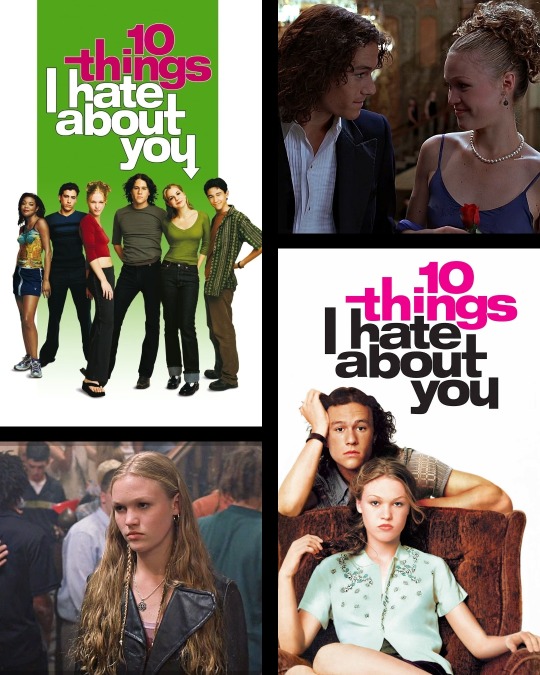
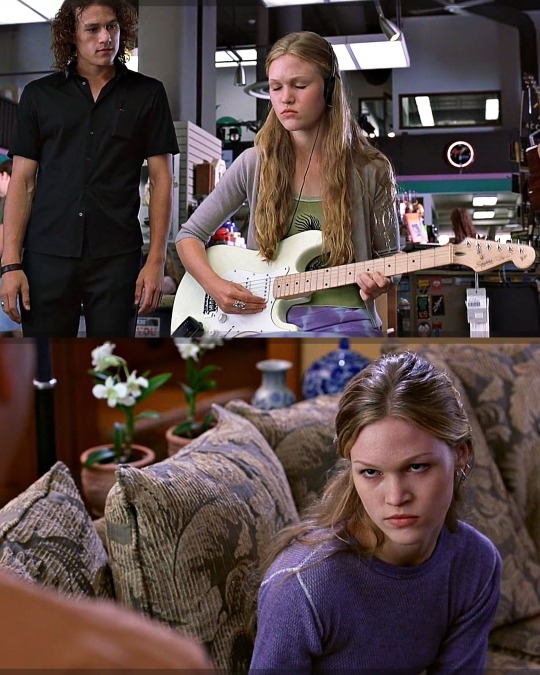

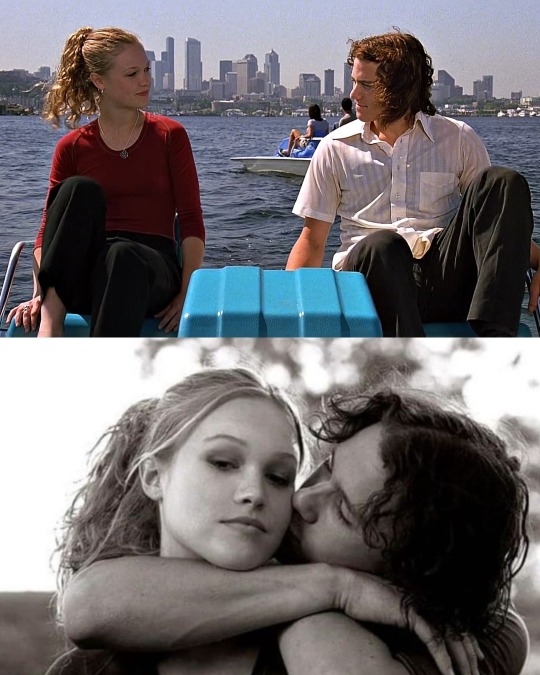
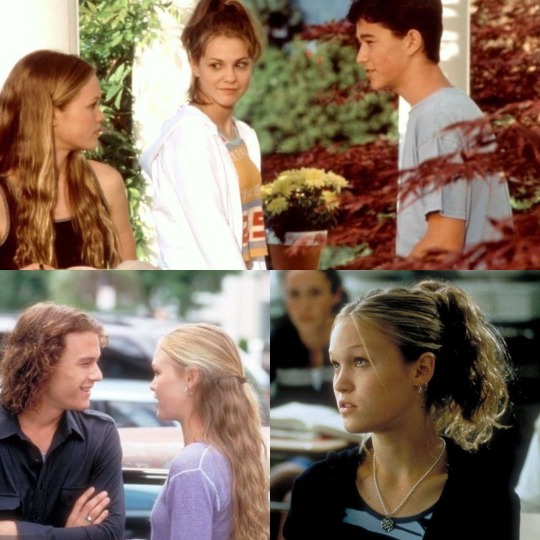
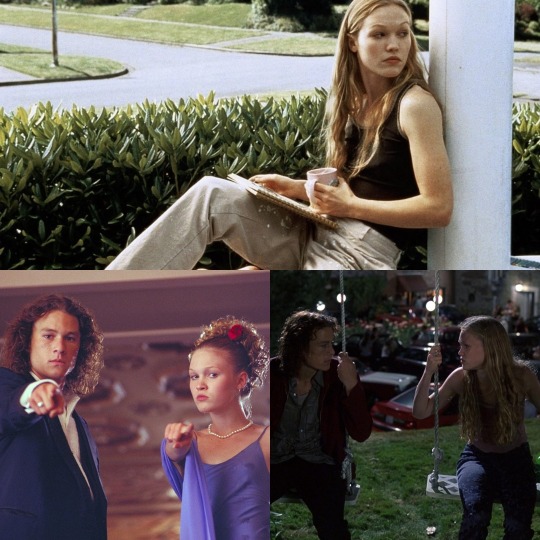
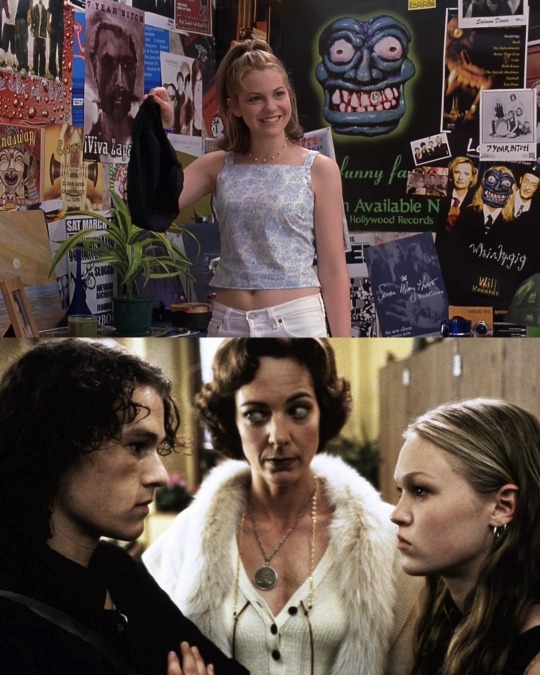

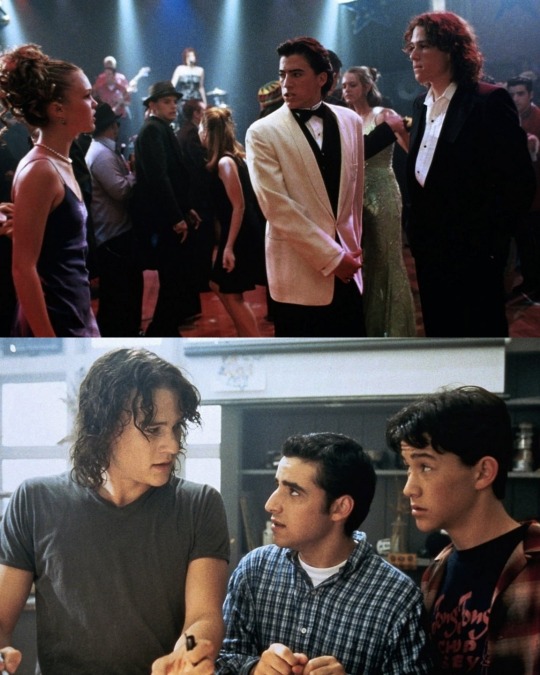
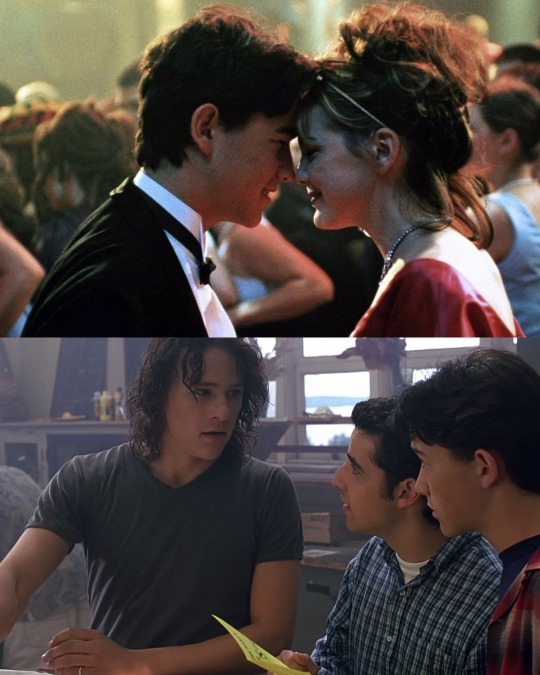
#movie review#film critique#movie night#must watch#cinema lover#cult classic#comedy#romance#drama#film review#movie buff#10 things i hate about you#julia stiles#heath ledger#90s movies#90s nostalgia
6 notes
·
View notes
Text
Broken Sword: the Shadow of the Templars

Broken Sword: Shadow of the Templars is a point-and-click adventure game by Revolution Software from 1996.
Broken Sword is an attempt to tell a serious conspiracy thriller/mystery story, with a complex plot and intelligent writing. Yet one that isn’t too serious and has plenty of humor and told with colorful visuals reminiscent of 2D animated movies.
It starts with a murder and bombing in Paris that our player character, the american tourist George Stobbart witnesses and narrowly avoids being killed by. And he decides to investigate the mysterious killing. He teams up with french photojournalist Nico Collard, and they soon discover a complex conspiracy involving the Knights Templar and their lost treasure.
Broken Sword is very much an amalgamation of its various influences, with there being clear influences by Umberto Eco’s Foucault’s Pendulum, Indiana Jones and the Last Crusade,various stories and myths regarding the Knights Templar, and Gabriel Knight: Sins of the Fathers. Gabriel Knight overall is the most obvious influence, which is not surprising, because it was one of the few prior attempts to create this kind of serious mystery adventure game. The protagonists are even a comedic blonde-haired american man and a dark-haired intelligent woman. Yet it does synthesize its various influences into something that feels fresh.
The story and writing is excellent. It is a story that treats its audience like adults and respects their intelligence. So it isn’t afraid to drop in references to things like Alfred Jarry’s play King Ubu. And the writing carries this learning lightly, with a genuinely witty sense of humor. It’s one of the funniest games I ever played.
And you need the humor, because this kind of conspiracy thriller stuff needs a certain tone to work well. It needs to take itself and its characters seriously enough that there is some genuine tension, yet not take the conspiracy theories too seriously. And Broken Sword manages this balancing act well. The conspiracy theory about the knights templar is used to provide the story with a dramatic weight drawn from history, and combines that with modern paranoia about the chaos caused by global neoliberal capitalism, yet it never takes that stuff too seriously. I like the Eco-inspired reveal that the modern evil conspiracy isn’t actually ancient, it just pretends to be and wants to appropriate the power and prestige of the templars. And the game knows how to keep the conspiracy stuff just fantastical enough to remind us that this is a fantasy, without being too over-the-top for the game’s serious tone.
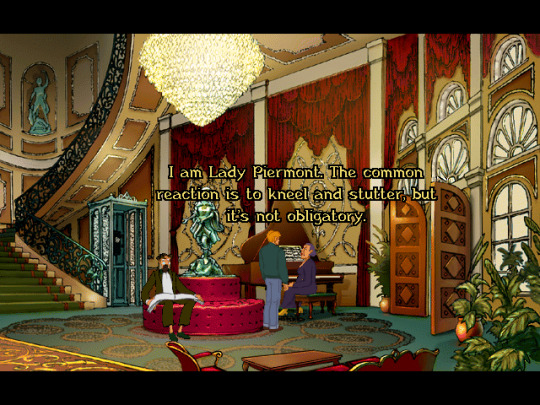
It’s not the same as Dan Brown’s The Da Vinci Code, where both the author and his most ardent fans took The Holy Blood and the Holy Grail conspiracy theory underlying the novel’s plot as fact. Broken Sword is often suspected of being an influence on The Da Vinci Code, which might be true, but might be a case of similar influences on both works. Broken Sword does reference The Holy Blood and the Holy Grail several times, characters are named Plantard and Lobineau, although the Jesus bloodline idea isn’t part of the actual plot, like it is in Gabriel Knight 3. What I would argue however is that Broken Sword is the kind of intelligently written conspiracy thriller that Dan Brown wants to write, but isn’t capable of writing.
The game is not perfect. The characters in the Syria sections rely on ethnic stereotyping that hasn’t aged well, even if I like the boy who learned english from Jeeves and Wooster tapes. And while George is far more likeable in this regard than Gabriel Knight, his closest predecessor, his infatuation with Nico does go into creep territory at one point very late in the game. These are both things that director Charles Cecil himself regrets. Still, I very much enjoy the writing in this game.
The fairly grounded if humorous tone of the game is reflected in the gameplay too. The game is very standard point-and-click adventure, no surprises here. But the game’s puzzles are largely devoid of the moon logic that could sometimes be a problem for contemporary adventure games, a design decision that reflects Broken Sword’s tone. The puzzle design is fairly simple, but therefore fairly intuitive. And that makes for a rather fun game to play. There are a few dodgy puzzles, but overall this game feels fair.
This is an adventure game where you can die, at multiple points in the story. And this does work to make the gameplay reflect the tension of the game’s thriller plot, by having actual stakes, game-overs, that George can actually die. And true to the game’s tone, they can be funny too. And while your progress can be set back quite a bit by a game-over if your last save was a long time ago, that’s perfectly fine. It has a point in creating tension. And there are no Sierra-esque “dead ends” or unwinnable situations that I could find, of the type “the player missed an item they need to progress, but can’t go back for it, so they are stuck,” so the game doesn’t become too hard. Those are not fine, and they are thankfully not in Broken Sword.

Finally the game’s presentation is top-notch all around. The graphics on a technical level is nothing spectacular by today’s standards, it’s fairly low-res 2D graphics. But by 1996 computer technology had progressed to the point that Revolution could use more detailed and slicker-looking 2D art than the pixelart of many previous point-and-click adventure games, and they took full advantage of that. The art design of this game is excellent. This game looks gorgeous, especially the lovingly-detailed backgrounds. Broken Sword has this warm and colorful cartoon-like look to it, reminding me of traditional 2d animated movies and the Tintin comic books. And the game’s animated cutscenes fit fairly seamlessly with the rest of the game, due to artstyle consistency (not always the case with video games), and help with the animated movie feel.The animated movie feeling is so convincing because Revolution Software hired people with that kind of experience to do the game’s art and animation, such as Eoghan Cahill and Neil Breen who worked for Don Bluth, or Roslind Allen who had actually worked for Disney on the Ducktales movie.
They similarly looked outside the video game industry when it came to the game’s music. The game’s composer Barrington Pheloung had composed music for various theatrical films and television shows, most notably Inspector Morse. And Pheloung composed an excellent soundtrack, that helps with the game’s epic feel, and the music is actually performed by an actual orchestra, instead of just using MIDI as many game soundtracks did at the time.
The game is fully voice-acted, which was becoming standard at the time, but the high quality of the voice acting is anything but common, not even today. The accents are often dodgy, but in a fun way. The standout actor is of course Rolf Saxon as George Stobbart, which would turn into the role of a lifetime for him. He would reprise in all future Broken Sword games and he feels irreplaceable as George.
Broken Sword: the Shadow of the Templars was a huge success, and remains popular and beloved to this day. It spawned a franchise that is still on-going. It feels like a point-and-click adventure game milestone. And this is despite it not being a very innovative game, there is little in the gameplay, story or presentation that we haven’t seen before. As a game, it really doesn’t do much that we haven’t seen in its predecessors in the genre by Lucasarts or Sierra or even Revolution Software’s own previous games, like the excellent Beneath a Steel Sky.
Broken Sword is still an adventure game classic that deserves its accolades. That’s because it does what it does very well, with a minimum of flaws. The game is not all that original in concept, but the execution is of the highest quality. It manages to become a classic milestone game by that alone.
Broken Sword is such an enjoyable experience to play that it feels like a benchmark of quality for point-and-click adventure games, one that is rarely met. In fact, Revolution Software’s Broken Sword sequels haven’t really reached the heights of the original, as much as I like the second and even the third game in the series.
Revolution haven’t even been able to fully recapture the magic in the game’s remaster from 2009, the Director’s Cut, which is overall a weaker version than the 1996 original. It adds puzzles and entire sections of the game where you play as Nico, but they don’t add much to the story. These additions are artificially grafted onto the original and feel like it, as they detract from the pacing. It reveals how tight the original game design and pacing is. The new art is by the great Dave Gibbons, but similarly it clashes with the original art. The new animations are worse too, often looking like a cheaply made motion comic compared to the movie-like original animations. The remaster also removes things, including bizarrely censoring the blood and violence in cutscenes. It’s a weird decision that maybe has to do with the fact that the remaster was created for the DS and Wii consoles, made by the sometimes aggressively family-friendly Nintendo. This also included removing the ability for George to die and get a game-over, removing the tension that created.
However, if you buy the Director’s Cut on GOG, it includes the original MS-DOS version of the game as an extra. And that version is easy to get running on non-dos systems with Scummvm. And this is something I recommend you do, it’s a great game.
#my writings#game review#broken sword#broken sword: the shadow of the templars#point and click adventure games
19 notes
·
View notes
Text
Alright fellas I watched the 3pac movie again and now that I've refined my thoughts I am going to share them (tornado warning)
Let's start with Miguel. Or really, with Nueva York. Beautiful, futuristic utopia, endless green grass and distant white skyscrapers against the blue sky, and for all of that there is not a single note of life within it. It's empty, just a hollow monument to "good", like Miguel himself. And like Miguel, its underbelly is dark and chaotic and unknowable - sunless tunnels cluttered with motorways and nothing else, the grinding gears of some unbearably massive machine that doubtless keeps the whole city running in its blind pretense of life, the gears of which visually threaten to crush Miles. Because Miguel O'Hara is a fucked up guy who is not only willing to be so violent against a 15-year-old child, but NEEDS to be. In true vampiric fashion (disclaimer: he's not a vampire) Miguel has an obsession beyond obsession, a predatory drive which must be fulfilled - but not for blood. For vengeance. Because he's already killed an entire universe of human beings. He's stolen a family he was never supposed to have, and then killed them all through his selfishness. And he has to make that someone else's fault. He has to be the Good Guy to live with himself, but inside he is the most detestable of monsters.
(Miguel and Uncle Aaron have a lot in common (inverted) especially with their emotional impact on Miles. He thought he could look up to both of them - but Uncle Aaron failed in regret, and Miguel seeks to amend his failures through more damage. Important that Miguel's theme is distorted synth, the same distortion which they used to create the Prowler theme)
Meanwhile Uncle Aaron acted the monster, but as Miles puts it he was a genuinely good guy underneath. He had no interest in being the kind of black man that Jeff is - slotting into white society, that is - and inevitably that got him pulled into being the Prowler. Everything's contained in what he said to Miles in his last moments. Every single Uncle Ben says the classic line, "With great power comes great responsibility", etc etc, telling Peter Parker to knock off the ego and be the kind of hero the city needs. But Miles is already that person. Uncle Aaron says "You're the best of us. You're on your way up. Just keep going."
Before he became Spiderman, Miles actively did not want to go to Visions Academy because he WANTS his ghetto friends, he WANTS his low-income Black Spanish life. He was perfectly happy to waste his intelligence and talent because he never figured he'd get anywhere to begin with. But now he's got a greater purpose in helping people, in being the best he can because no one else has the power to be Spiderman. When Uncle Aaron says "You're the best of us", he doesn't just mean their family. Miles managed to escape the pull of gang violence and the twisted honor-and-glory appeal of thug life and the oily black tendrils of poverty entwined around his legs. He shook off everything that we now know was supposed to be his destiny, and he has never looked back.
But in doing so he doomed Miles G to that very fate. The first movie didn't touch much on that aspect of urban blackness, likely because white audiences would not care. But now you love Miles! You ain't got a choice now! They tricked you, man!
42 Miles, or Miles G. Morales as he's credited, has experienced a greater loss with nothing to hold on to besides the structure of gang violence within a falling, burning city. His father is dead, both stripping him of that moral figure and discounting all the ideas that Jeff tried to instill into his son - because those are the beliefs that got him killed. If you don't wanna get killed, you better get some power and some respect, and never let go of either. Uncle Aaron, still the original Prowler, steps in as Miles G's father figure, making sure Rio's financially okay and not too stressed, reassuring her that "We're family". Family is everything, it's the only bond they have, and Miles G would do anything for his mother. Anything at all. The voice actor leans more into the Puerto Rican accent, rolling the R's and accentuating S's, whereas our Miles talks more black even when he's speaking Spanish - his father's absence, and his love for his mother above all else.
He's the man of the house now. He's gotta provide, and he's gotta take care of his mother. 15 years old, Miles G has design schematics for the current Prowler gloves posted on the wall of his room - it's a far more active part of his normal life than with our Miles, who keeps his Spidermanning entirely separate (for now). It's bleeding into his everyday, infecting his soul with every heist, collection, and murder that he carries out. It's not Uncle Aaron's fault. He loves his nephew, and without his father around, he wants the kid to have respect, to not have to work his way up from nothing, so he passes him the mantle. Uncle Aaron was undoubtedly drawn into that life by something similar. That's how the cycle self-perpetuates. The result is a 15-year-old kid with the eyes of a combat veteran.

Here is a kid who does not hesitate, who does not forget or make mistakes, who jumped into this life headfirst because he knows there is no other choice. For him there is no way out, and he is far from the only one.
Ain't no love in the heart of the city. Red light pouring in from the fires outside and the soul-death inside, the bloody inevitability, the need to protect themselves and their own because no one else will. This violence is the only pathway. Violent death will come whether or not you follow it. And staring into his own face and yet much older eyes, our Miles is just beginning to realize exactly what he's escaped and what Liv's collider portal doomed this kid and this world to, all because of a tiny little spider. And he has switched fates, as in the first film his Spidey-Sense started out as green and purple, then turned red and blue as he vibed with Peter. Over the course of a few seconds, we witnessed his destiny change. The colors of this interplay between worlds are green and purple, green and purple, the Prowler's colors.
And red, as Miguel tried to ensure that fate (execution) is carried out. Miguel blames Miles as the "original anomaly", yet he conveniently ignores the spider, or Doc Ock who brought it over and started this whole mess, or Kingpin who funded her. Miguel is willing to physically attack a black child for his own misplaced regret and self-loathing. Beyond that, I genuinely believe that if he had reached Miles in the Go-Home machine, he would have killed him. The madness in those ripping claws is not something stopped by the sudden softness of flesh. It's only Spider-Byte who stops him - she (black female tech-heavy Spiderman, vibed with Miles instantly on those principles and others) could have shut down the machine and trapped Miles. But he looked at her, and she saw that he was a terrified child, and she knew that Miguel is incapable of mercy or critical thought, and maybe she wanted to believe in him. So she hesitated, most important savior Time.
Before we move on too far, back to Miguel and Miles. Miguel's fangs secrete a paralyzing venom - probably he was trying to incapacitate Best Vulture using that, although with the bestial transformation of his silhouette perhaps he didn't care if he ripped Vulture's throat out by accident. Regardless, he only seems to use this as the definitive way to End Fights. Miles has a similar ability in his venom blast or whatever he calls it. I swear the word "static" was in there somewhere. The difference is, Miles uses it as a defensive mechanism, not offensive (Armadillo guy aside). He uses it to get out of bad situations and continue the fight, to break down barriers and temporarily stun his opponents so he can break free and recover. We see him preparing to do this at the end of this movie, too.
Again, Miguel needs to view himself as the superior protector of all universes in order to pretend like his mistake is in any way acceptable. Beyond that, he blames Miles for it, so that he does not have to forgive himself/Miles, he can just eliminate the problem and pretend it's all over. Miguel the controller uses his ability as the be-all end-all, whereas Miles uses it as just one method among many in his arsenal.
Now. The only named black Spider who doesn't vibe with Miles is Jess Drew, but that's explicable by the following reasons. First of all, she's pregnant - Miguel destroyed his stolen kids by breaking canon, and neither Peter B nor Jess want to risk their own new families by going against Miguel's canon laws. Secondly, she's a black woman who is basically Miguel's right hand (within the fact that he cannot and will not ever trust anyone else with this "responsibility" he claims for himself), and there's not much to be gained from abandoning that, especially in context of the first point.
You know who does vibe with Miles?
HOBIE
MOTHERFUCKING
BROWN
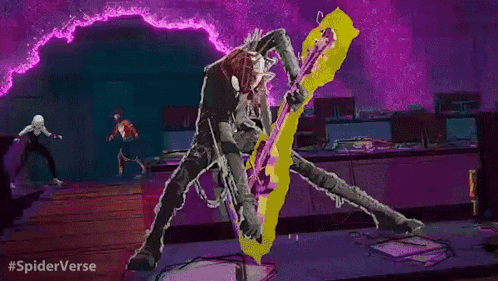
Hobie fucking loves Miles right from the start. He's only in the Spider-Society because he knows Miguel's insane and his actions and orders are inhumane and all kinds of fucked up. But Hobie's basically alone in that knowledge, as even Gwen still wants to believe that it could be a good thing, and so he's just infiltrating, learning more and stealing shit to recreate Miguel's technology without Miguel's restrictions. And when Miles comes along and starts speaking out against that shit, he loves it. He encourages it. And he uses Miles' distraction to slip off and put his own plan into action.
From the second he meets Miles he's looking out for the kid. Part of that's because he's true punk (incredible to see, especially with him being black and this movie being so commercialized by its marketing/sales teams) but part of it is that he recognizes Miles. Hobie probably also has a static venom ability, since he's the one who tells Miles that it works better using the whole hand (and reminds him, later, while everyone else is telling him to calm down or hang in there and only Hobie is still on his side telling him silently to fight back). It's possible even that since he used his guitar to break the forcefield barrier, and since it is not plugged in to anything but still makes electric guitar noises, that the guitar acts as a sort of amplifier for that power.
He never tells Miles what to think, he just encourages him TO think. And he's always there with his own laconic opinion to point out how fascist Miguel's little Spider Utopia is to anyone not a Spider - and anyone who disagrees with Miguel the Controller. More personally he indirectly asks if Miles has a safe home to go back to, and he STAYS THERE when Miguel's being a dick to a 15-year-old kid.
There's more to recognition than that, though. See, Hobie Brown also escaped the fate of becoming the Prowler. The original Prowler, since inception and for most of the comics' runs, has been a black man named Hobart Brown. Hobie as Spider-Punk is and always has been a subversion of the black male stereotypes that led to the creation of the Prowler (very normal and not racist name there by the way), and without losing any of his Blackness or masculinity or Black masculinity. Hobie and Miles have more in common than any other Spiders, because they've both beaten that expected fate of black men to fall eagerly into violence and gang warfare and criminal careers. And Miguel wants Miles to feel unworthy of that escape - he wants Miles to believe that he does not belong in a chosen betterment; that all he was ever meant for is poverty and wasted talent and endless violence.
But Miles won't let that happen! "I'ma do my own thing," and he's got that confidence in himself now. And Hobie's got his back cause things are finally moving, he's not alone in trying to dismantle Miguel's fucked up utopia with the gears of that great machine beneath grinding up anomalies and black children to keep it all running so flawlessly on the surface. Miguel lives in "Nueva York", he's never had to subvert much, the darkness within him is not that which he keeps at bay via that injection, it is the monstrosity which he lets fester and flourish under the name of "dedication". Miles comes in and disrupts that perfect lie in about ten minutes, he's already boiling and he won't accept a fate he does not want when he's already escaped it once before.
Hobie's been hanging around for some time, making himself appear lazy and carelessly destructive to hide his far greater intentions. As long as Miguel "just can't" with him, he's being underestimated, and as long as that is the case he is free to undermine and plot and replicate as much as possible. That's black intelligence. "Man like Miles!"
Good movie basically
#atsv#spiderman: across the spiderverse#3pac#hahaha#miles morales#spiderman#miguel o'hara#spiderman 2099#hobie brown#spider punk#aaron davis#the prowler#42 miles#miles g morales#prowler miles#jess drew#words i speak
30 notes
·
View notes
Text
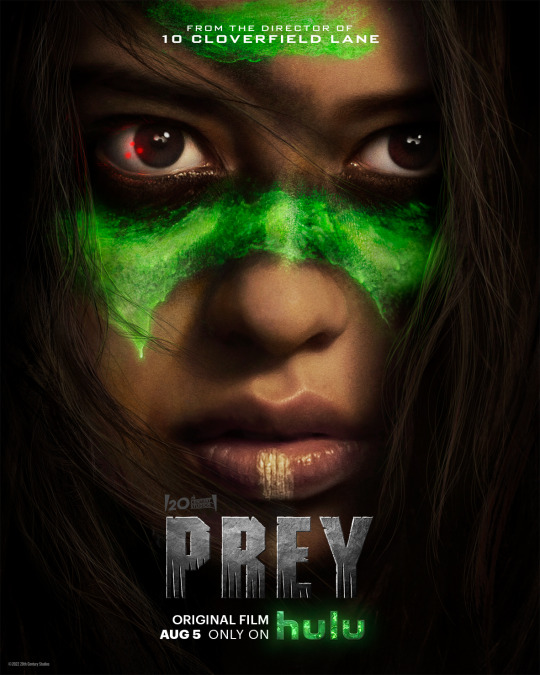
From "Prey" to "Predator"
The presentation of perspectives from those who are "prey" in the food chain, "the oppressed" in the colonial era, and "the underdog" in human society.
Prey (2022) is told from the perspective of a woman, who is often viewed as "the prey" in both the hierarchy of the food chain and human society. It reflects the natural order where the weaker are typically preyed upon by the stronger.
But in the world of humans, "strength" does not solely mean "physical power." It can also refer to "intelligence and spirit."
This is the intriguing angle that the producers, director, and team behind the new Predator franchise film sought to explore. Until now, each installment has told the story from the perspective of the Predator and its male adversaries. However, this time, the movie takes the audience 300 years into the past.
In this era, North America was still a vast, empty wilderness, filled with stunning natural beauty and inhabited by Native Americans. At the same time, Europeans—such as the French—began to explore new territories for hunting and conquest, similar to the English and Spanish. Most importantly, this was the first time the Predator was sent to Earth, to seek out the strongest life forms and overthrow them to maintain its supremacy as the ultimate predator in the food chain.
The choice to make a woman the protagonist adds a distinctive and interesting twist to the film, creating suspense as audiences wonder how a female character, typically viewed as prey, will defeat the Predator. It also helps build a new audience base, as telling the story from a fresh perspective essentially creates an entirely new film. Even viewers who have never seen a Predator movie can follow the story.
Conversely, hardcore fans of the Predator franchise will find small details or Easter eggs connecting the film to earlier installments. Another significant point of interest is how the movie celebrates female power and raises awareness of the struggles women face in fighting for equality and recognition in society.
A Subtle Celebration of Female Power
Prey not only tells the story of life from a female perspective, but it also reveals to the audience the knowledge and abilities women possess, as well as their fight to gain the right to express themselves and their talents in a male-dominated society.
The narrative emphasizes how Naru faces challenges, both big and small, from external factors (wild animals, men, colonizers, and the Predator) and internal ones (her own carelessness and undeveloped skills). These challenges gradually shape and weave Naru’s character, transforming her from a girl inexperienced in killing into a skilled huntress. Through constant learning, practice, and observation of her own and others' mistakes, Naru grows stronger.
The film shows that she works hard to correct any errors through action rather than complaining or boasting about her strength in an exaggerated way. This approach prevents the audience from feeling that the movie is trying to forcefully impose feminism.
Today, some directors push overly feminist plots or characters into their films to capitalize on the current trend of celebrating female power, often to the point of “belittling or oppressing men,” which is not the right approach. Naru, therefore, emerges as a female character who embodies feminist power (in a subtle and respectful way) that everyone roots for, as they witness her steady development and growth.
Facing Danger and Embracing Female Strength
When faced with dangerous situations and the need to fight the Predator, Naru learns that her "femininity" or "female abilities" can also be very useful. For instance, her knowledge of herbal medicine allows her to treat injuries, and she learns to use herbs to lower her body temperature to evade the Predator's heat vision.
Naru exemplifies someone with diverse knowledge who learns to apply it effectively and appropriately to various situations, without feeling inferior or dismissing her skills as trivial. When the time comes to utilize her abilities, they consistently prove to be life-saving.
The Real Man
Taabe is another important character who undergoes significant development. What makes this character interesting is his depth and humanity. As a male in a family that lost their father when he and his younger sister were still young, he naturally assumes a leadership role. He consistently hones his hunting skills to provide for his family, which can be seen as a way of caring for his mother and sister. At the same time, he playfully teases his younger sister, making her feel embarrassed or self-conscious almost all the time (Big Brother-Little Sister, Siblings Fight). This dynamic reflects a tough love relationship, where he cares deeply but doesn’t always express it openly.
In some scenes, he confidently exhibits typical masculine traits, such as showing off, bragging, and explaining things to Naru, whether she’s interested or not (Mansplaining). At times, he fails to anticipate the consequences of his actions or doesn’t think things through, a common impulsive tendency among many males. Yet, he also deeply cares for and loves his sister. Taabe knows her true identity and capabilities well, always seeking opportunities for her to showcase her talents whenever possible.
If we set aside their sibling relationship, Taabe and Naru’s dynamic can also be seen as that of senior and junior (Senior-Junior) in their respective roles and responsibilities. Taabe, as someone with more experience, often imparts hunting skills and the ways of a warrior to Naru whenever the opportunity arises. When it comes time to confront the Predator, Taabe fulfills his role to the fullest, living up to the title of "War Chief" bestowed upon him by his tribe. He fights valiantly and sacrifices his life to protect his sister until the very last moment, marking him as a truly honorable warrior and a commendable man.
Taabe serves as a model of a good man—one who takes pride in himself and the life choices he has made without feeling that his masculinity is diminished by giving women the opportunity to showcase their abilities. He remains a capable leader without resorting to aggression, bullying, belittling, or oppressing others to feel superior. Instead, he supports and creates space for his sister (a female) to demonstrate her capabilities collaboratively, recognizing that the nuanced and different perspectives women bring can greatly enhance problem-solving in both life and work. This quality is what his all-male warrior team lacks: the use of intellect and observation, rather than being stuck in gender stereotypes that limit women to predefined societal roles.
Moreover, Prey (2022) reflects the diversity of abilities and teamwork needed to solve various problems. A successful team must consist of a good leader or mentor who recognizes the potential in their subordinates (Taabe - male), diligent employees or junior colleagues who constantly seek to improve themselves (Naru - female), and supportive individuals or behind-the-scenes helpers (Sari - the dog).
Even in the face of numerous obstacles, learning to adapt and find new ways to solve problems can help overcome challenges, including those posed by the Predator.
#prey#movies#film critics#predator franchise#native american#indigenous#people#feminism#analysis#gender socialization#history#power#learning
2 notes
·
View notes
Text
ROTB and Black Women's Rep

I know there is a lot of negative talk/critique about the women in ROTB, but I wanted to just share as a black genderfluid person, how liberating at least it has been to me to see actual black women portrayed well in a live action tf movie. I understand to a lot of people, the antiblackness that was always a common staple in live actions transformers history, didn’t impact them but it impacted me. And it’s lack of black women, yet making black women (and people) caricatures at any chance they got, was also really upsetting to me. And the way women in the bay films were treated in general was bad.
Rotb was important to me as a black woman fan because for once, we got to see a whole female cast dominated by black women which is rare, if not unheard of for transformers live action media. And they were all given respectful narratives, not made into caricatures and given a chance to shine. A lot of people have made comments about how rotb’s portrayal of women was awful, or how women were failed, and I understand that perspective. I also do not think that by any means, ROTB was perfect in its portrayal of women.
What I do believe however, is that tf live action portrayals of women have come a long way since the bay films. But for people who are not black women, they may not understand nor care about the importance of for once, seeing black women and culture taken seriously on the big screen. The black female characters, in my opinion, were written well. They were given nuance, a respectful narrative and weren’t jokes, caricatures or canon fodder. Elena, the first black live action human, was a breath of fresh air away from what we were used to. She wasn’t white, shy wasn’t super skinny and she didn’t exist as a sex object or a point of romance. She was smart, she also showed us a very real example of microaggressions and racism black women need to face in the work place. Yet, that wasn’t made into a joke, and she was taken seriously by alien life forms when her white female boss ignored her.
And that’s just something refreshing. We have a black human woman allowed to be flawed, and also allowed to have her subtle experiences of racism taken seriously without being demeaned for it, but we also see how she is integral to the plot, and how her presence was needed in order for the plot to move forward.
I wish we got more Arcee- but I love that she was humanized rather than just made into a joke or a sexual object. She was shown to be extremely intelligent, skilled, understanding, and she was a good fighter and more importantly she wasn’t a caricature. Her being a black woman didn’t dicate how the audience saw her or how she was written. She was written with so much respect and was over all and interesting character.
I could say the same about nightbird. Because not only was she a formindable villain, but she was played by a transfem afro Latina actress, one of my favorite actresses actually, who brought her to life and that was just refreshing to see. again, in media where black trans fems are usually made into cariactures or jokes, I love that nightbird was taken seriously as a villain and a black female character.
My point is that, just because there are issues with the writing of female characters, doesn’t mean you need to discount the actual importance of Black women in the show. I think a lot of people, who are not Black women, and who don’t actually think of or care about Black women’s issues, are quick to not consider how maybe looking at ROTB’s women intersectionally may add more avenues to the conversation of women’s representation. While I don’t think that the film was flawless in its portrayal of women, I think it’s a huge step up and I do think that in the future, things will get better. But for now, as a black fan and a black woman, I absolutely loved seeing and hearing women that looked and sounded like me on screen.
Now, again this doesn't mean that you can't critique the portrayal of women in ROTB, because I have a lot of issues with some portrayals, especially Airazor and even more so, I wish Arcee got more screen time. But at the same time, if you are critiquing the majority Black women, make sure you actually open your space for Black women to give their opinions on things without getting offended. Especially if you are white or non-black yourself.
As always, if you enjoy my blog, consider following my twitter and sharing this post there
15 notes
·
View notes
Text
Verdict: I liked it!
The Super Mario Bros. Movie was absolutely a love letter to fans. Yeah, I’ll admit that if you didn’t grow up with Mario, there’s not much for you in terms of story. It’s your basic Family Member Goes Missing, gotta save them and also Save The World I Guess kinda movie. I won’t give a comprehensive review, but I’ve got some thoughts about it :)
Positive
- Deep cuts! Foreman Spike from Wrecking Crew, as well as Charles Martinet cameoing as classic Mario’s design, was a nice touch
- Yeah, it’s an isekai, but isekais aren’t inherently bad. Mario has a lot of different continuities, and in some it is an isekai. They obviously care a lot about the Super Show, doing the jingle and all. They manage to respect their audience’s intelligence, and don’t provide much exposition (which is awesome!)
- Diversity! There were so many Mario enemies and races in the movie, it was great. Shyguys kidnap Luigi, Dry Bones chase him through a swamp reminiscent of Luigi’s Mansion, the penguins from 64 have their own kingdom, all kinds of Koopas and Spinies make appearances, Goombas look like Goombas, there are like a hundred unique Kong designs, and we get a Luma! I’m not sure if it’s meant to be Lumalee or not, though they do bear a striking resemblance to them. The writers did their homework.
- The jokes for we the fans were genuinely pretty funny. There’s a part when Mario is fighting DK and has only tried one type of Power Up thus far, a regular mushroom to make him bigger. Mario grabs a blue Mini Mushroom, unaware of its effects. The audience gets to see Mario triumphantly grab the mushroom, thinking it’ll make him stronger. There’s a good moment for the audience members who know exactly what’ll happen, but those unaware of the Mini Mushroom won’t until it happens and Mario goes tiny.
- A good Power Up selection! I was afraid only the Fire Flower would be used, but we got Cat Mario, Tanooki Mario, Fire Peach and DK, Ice Flower Peach, and Super Star Mario and Luigi. Here’s hoping the sequels will use Bee Mario, Penguin Suit Mario, and Frog Mario. Oh! And the Feather Cape is kinda cameoed in their plumbing commercial, when they’re posing on the stools wearing capes. That was pretty neat.
- A solid mix of games’ soundtracks and elements. I didn’t notice much from Sunshine unfortunately, no FLUDD or Bowser Jr or anything. Come to think if it, does Bowser Jr exist in this continuity? How about the Koopalings? Evidence of Ludwig exist: the piano Bowser plays is Ludwig von Koopa brand, which was really funny.
- Bowser. Bowser Bowser Bowser. I think he was perfect, honestly. We all knew it when Jack Black stepped up to the plate, but seeing the piano scenes. And him dressed in his suit with the top hat. Man. I’m so glad they went for a mix of dopey lovesick Bowser from Odyssey and super powerful firebreath Bowser from Galaxy. I really like that if you censor his Peaches song correctly, you could make it sound like he’s saying “bitches”, which is objectively funny. No bitches :’(
- The Jungle Kingdom was a super fun segment. Literally a rollercoaster. I really enjoyed the showdown between DK and Mario, the sound effects and music were on point. They play the opening riff that plays in the original Donkey Kong when he bends the girders, and then. The DK rap plays. It was so unexpected that I had to laugh aloud. DK uses it as like his personal anthem, kinda like how professional wrestlers have a signature song they play when they come out into the ring. The unique Kongs were really cool to see too, like in the stands and the dude who drives them into the kingdom. At one point Diddy in the stands has the bongoes from Donkey Konga, it’s all a blast.
- Speaking of, Seth Rogen’s DK is surprisingly strong. Like, dang, I didn’t expect the “Seth Rogen laugh” to actually fit DK’s character, but it does!
- Okay, fine, Crisp Rat did a passable job. I never forgot it was him, but they eased into the voice by having him do a fakey Italian voice at the beginning. Still waiting on the dub featuring English cast + Italian dub Mario with no subtitles. Considering how low in content the story is, it would be a perfectly fine movie if you muted him completely :)
- The animation! I mean, you’ve seen the trailers, this is the best work Illumination has done, no question. I really like how they partially modelled the characters after their VAs. Bowser is just dripping with Jack Black’s chaotic energy, and Luigi and Mario are eerily reminiscent of Charlie Day and Crisp Rat despite being 100% Luigi and Mario. Toad is pretty solid as well, Key does a really good Toad voice without it being incredibly grating. Jack Black’s smile and Parks & Recreation-era Crisp Rat seem to be some inspiration behind the way they emote.
- Peach is pretty good. I like her voice, Anya Taylor Joy understood the assignment. She isn’t too “girlboss-y”, and she’s actually kind of a weirdo. I love that for her. Makes sense, she was raised by Toads and all. She only brings Mario along to help him, and she isn’t really saved by him at all. She’s delightfully pink and pretty, and oooh her wedding dress, Fire Flower dress, and Ice Flower Dress are all soo pretty. Like seriously, I want that wedding dress. She only gets to hover exactly once during the training montage, and she doesn’t get her parasol, but otherwise I quite liked her. She doesn’t have any groundbreaking character development or anything, or even much for flaws, but she’s just peachy in my opinion :)
- I think the Question Blocks serving as Toad ATMs was really funny. Also, I liked that Pauline was on the TV in Brooklyn. And the brothers’ family was fun to see, they absolutely captured the Italian-American family dynamic. Also, acknowledging the white gloves was pretty funny. We got to see Mario’s actual hands, too, which was… unsettling. Luigi’s ringtone is the Gamecube startup sound, Mario’s playing Kid Icarus on his home TV, Satoru Iwata features in the credits, and the little retro shop in the Mushroom Kingdom was neat. I feel like they referenced all throughout Mario’s history, unlike the Sonic movies where they only focused on the golden years of the Genesis games (no shade to the Sonic movies, I actually really liked them too)
- Oh the score. Ohhhh the score. Just… the score. Not enough Galaxy rep, but it’s forgiven. They use the themes from Mario games so well, it’s actually incredible. Just, like, go watch it and see how many you can recognize. I think I got most of them, though I wish they used the Wii Rainbow Road music since that’s the RR I’m most familiar with. Ah, well. I’m not sure if they used a Mario Kart theme for that scene or nor, someone who’s played the other Mario Karts will have to tell me
Negative
- crisp rat >:(
- Lack of Sunshine rep :( I can’t remember if there were any musical references, but I didn’t detect any, anyway. No Shadow Mario, Bowser Jr, Piantas, or FLUDD. Maybe we’ll get to Isle Delfino in the sequel?
- No Funky, Birdo, Rosalina, Daisy, Wario, or Waluigi. I can’t expect to get all of the fun side characters, but when I saw the Kong kingdom and the Luma I had a few shreds of hope that Funky and Rosa would show. I have a feeling Miyamoto doesn’t really like Wario/Waluigi, which is fair but sad. There wasn’t much room for Daisy and Birdo since the movie was so quick-paced. With the Yoshi egg teased at the end, it is possible Birdo will appear in the sequel? Maybe? And since it is an isekai, it’s revealed that no humans are native to the Mushroom Kingdom/Peach’s world, so maybe Daisy just doesn’t fit in this narrative. Ah, well.
- I have a feeling other reviews will remark on this, but Cranky is kinda weak :( I expected him to get better dialogue/direction, since I think Fred Armisen is generally a good actor. He just wasn’t… cranky enough? I dunno. Every time he spoke, I just pictured a voice actor in a booth instead of Cranky Kong.
- The story was… a Shigeru Miyamoto story. That is, no real intense story beats. They don’t really try anything new, but hey. You don’t walk into the Mario Movie expecting Miyazaki, y’know? It was all a bit too fast-paced for me, but I get it, it’s better than senseless filler. Illumination likes cheap movies, so the short runtime might cover for the quality animation.
- The licensed songs aren’t abysmal, but I wish there were fewer where Mario songs could have taken their place. I dunno, as much as I love Take on Me, I feel like there’s a better song out there for introducing the Jungle Kingdom.
Aaand those are my thoughts! I have more, but I’m sleepy and it’s 1:58 AM for me at the mo’. I’m sure I’ll be MarioMovie Posting in the future :)
#mario movie spoilers#the super mario bros movie#the super mario bros movie spoilers#spoilers#review#mario movie#mario movie review#mario#super mario#nintendo#super mario bros#luigi#bowser#princess peach#donkey kong
44 notes
·
View notes
Text
Film Review - Legally Blonde
Prefacing this by reiterating I have a certificate in women and gender studies.
This was my first time watching Legally Blonde. I knew it by its reputation as a pop culture sensation. I knew the basic plot—woman goes to law school to try to win back her boyfriend—I knew about the tiny dog, and the “what, like it’s hard?” quote. To me, a blockbuster is something that permeates culture to be known by people who’ve never read or seen the source, and Legally Blonde was in that category for me. Contributions to the film’s enduring success include its nostalgia value, a strong and lovable protagonist, and a simple yet well-loved plot structure of coming of age and triumphing over adversity, with a “girl power” twist which, while somewhat dated in the year 2024, speaks to the feminism and women’s fiction of the early 2000s and still shows relatable experiences of working women in any year.
To start with, the film is incredibly indicative of its era, which adds to the nostalgia value. You couldn’t try making Heathers in any decade but the 1980s, Seinfeld is the quintessence of the 1990s, and Legally Blonde is a testament to the early 2000s. The bright colors and flower patterns, the low-waisted pants, the faux fur pink telephone, and many other small details all speak to the year 2001. The DVD I picked up from the library asked me to select widescreen or standard, and it was a blast from the past. Audiences enjoy stories that transcend time while simultaneously preserving the culture of an era.
I found it interesting that the film had some of the elements of a coming of age story, yet Elle was not a teenager and not even in undergraduate for most of the story—she was a law student and a young professional woman. I would hazard a guess this could fit with the burgeoning new adult subgenre, but new adult is a relatively recent phenomenon. Therefore, this is what I considered to be the “high concept” of Legally Blonde, a story of learning who you are and finding your place in the world that a wider audience can connect with. It was ahead of its time.
Legally Blonde’s feminist elements further set it apart from other coming of age stories. Parts of the film were dated; most troublesome to me were the casual remarks about weight and body size as something to be ashamed of, which is something we’re trying to move away from in modern times. However, many of Elle’s experiences are things that anyone affected by misogyny can relate to. From the very beginning, Elle is introduced to us as someone intelligent who won’t allow herself to be talked down to, someone who has spent her life experiencing people making assumptions about her capabilities just because of her body. The interaction with Elle shutting down the conniving saleswoman at the dress shop sets up the rest of the story. The arc with Elle and Vivian becoming friends after realizing women don’t have to compete with each other, especially over a scummy guy, was uplifting. I was surprised, yet not surprised at all, when Callahan made a sexual advance on Elle. In the audience, the sexism and harassment Elle faces evoke a righteous anger, and the audience lives vicariously by seeing her triumph and seeing those who harmed her fall from grace. I particularly enjoyed the twist with Elle’s strict female professor being seen at the salon and giving Elle the pep talk not to give up just because of some disgusting man. Young professional women need women mentors. Not only did fellow women stand up for Elle, but other men did too, which was very important to show. Men can and should be allies, and women don’t have to fight for themselves against the patriarchy.
Centrally, the film rails against the double-bind. Put simply, this is the idea that women can never win. In Legally Blonde, we see: if a woman is feminine, she’s a bimbo, and if a woman isn’t feminine, she’s a bitch. Either way, she isn’t respected in the workplace. If you’ve seen the 2023 Barbie movie, Gloria’s speech towards the end is about the double-bind. Every time someone tells Elle she isn’t serious, she fights back. Elle returning to court in her pink outfit is the moment of catharsis. You can know about law and haircare, you can be feminine and professional, and you can succeed without losing any aspect of yourself.
On the subject of queer experiences, the film gets a little leniency in my mind for being from the past. Portraying men and women as inherently different, gay men as comic relief, or lesbians as a social justice warrior stereotype was never the right thing to do, but it was 2001, and we can be happy we’ve progressed far since then. (And also that scene with the scorned boyfriend in court was one of the funniest things ever.)
As a final, small note, I recall a passage from Writing the Blockbuster Novel by Zuckerman, which was written in 1994. It shared the advice that audiences at that time period enjoyed stories that portrayed an idyllic, affluent lifestyle. Legally Blonde, from just seven years later, shows communities at UCLA and Harvard law school. Elle, her client, Vivian, and almost every other woman in the story are fashionable and well-off. Additionally, every main character is white. Food for thought: the struggles in the film are relatable to an upper-class, white female audience. It was 2001 and this isn’t unexpected for that year, but what does an empowering story look like for women of color or working class women? We need more blockbuster hits that showcase intersectional feminism.
The quote on the back of the DVD case is an apt conclusion for my arguments. “A feel-good girl-power comedy!” –People. I believe the main reason for Legally Blonde’s blockbuster success is because it makes the audience feel good. Everyone affected by misogyny, more or less, can relate to at least one of the struggles presented in the film and feel comforted by seeing Elle triumph over them. It’s not only relatable, but funny. It’s quotable. It’s different than other coming of age stories. It’s a product of its time, with all the pros and cons that brings.
4 notes
·
View notes
Text
Week 7 Short Essay Part 2 – Sex, Lies and Videotape similarities to Ghost Dog: The Way of the Samurai
By Christian Lavarello
The films, Sex, Lies and Videotape by Director Steven Soderbergh and Ghost Dog: The Way of the Samurai by director Jim Jarmusch have more differences than similarities, yet some noteworthy similarities to mention.
youtube
Ghost Dog: The Way of the Samurai was released by director Jim Jarmusch which tells the story of an urban samurai, a man who was saved when he was younger by Louie, a mafioso. Sometime later, Ghost Dog reappears before the mafioso and, in accordance with his samurai ethical code, admits he is in debt with Louie. Louie turns Ghost Dog into his own efficient, uncatchable hitman and nobody knows his "real" name and they communicate via carrier pigeon-delivered messages.
youtube
Sex, Lies and Videotape follows the intertwined lives of four individuals living in Baton Rouge, Louisiana: John, Ann, Cynthia, and Graham Dalton. John is an attorney who is having an affair with his wife Ann’s sister. Ann claims to not want sex anymore, being excessively concerned about world issues. Graham is ‘brutally honesty,’ especially about the fact that he is impotent and the only way he can have some physical satisfaction is by videotaping women talking about sex and their sexual encounters. With his arrival, everyone’s deceptions and hypocrisies come to the surface and so does Ann’s desire to have to sex again.
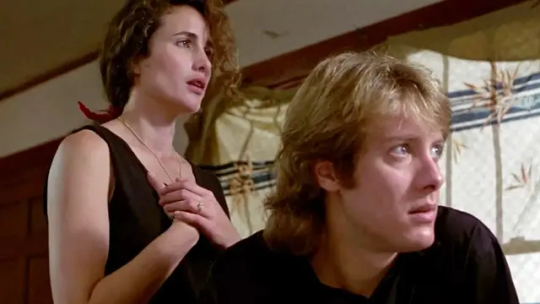
Sex, Lies and Videotape received a few awards and mostly positive critical reviews, Robert Ebert stated, “I am not sure it is as good as the Cannes jury apparently found it; it has more intelligence than heart and is more clever than enlightening. But it is never boring, and there are moments when it reminds us of how sexy the movies used to be, back in the days when speech was an erogenous zone”. Ghost Dog: The Way of the Samurai received a mixture of review, but mostly positive one from The Howlander, states, “On the surface, the film is monotonous and the characters unfeeling, but a strand of profundity runs throughout the film, and that’s where its subtle intelligence lies”.
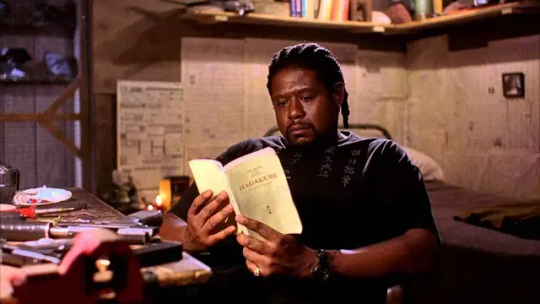
As stated previously, films received a lot of positive reviews and they focused on the strengths and messages from each category, yet they both have a deep artistic meaning to them. For instance, throughout Ghost Dog: They Way of the Samurai, director Jim Jarmusch structured his film is from a Samurai Hagakure passage in which Ghost Dog narrates himself and each Hagakure passage demonstrates a new lesson on being a proper samurai. These passages make the audience see a deeper side of the main character and connect with them by understanding their actions in more depth. Sex, Lies and Videotape does an amazing job of keeping the audience guessing and trying to figure out the characters’ actions and behaviors. Director Steven Soderbergh delves into themes of intimacy beyond sex and the unspoken connections between characters which also connects the audience to the characters themselves. The audience gets to see a vulnerable side of the characters and beneath their perfect exteriors.
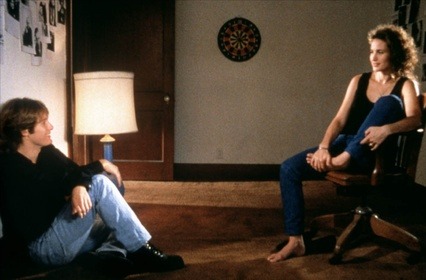
Both directors did a great job of creating connections to their audiences in very different ways and they did this while sticking to a tight budget. Sex, Lies, and Videotape (1989) grossed about $36.74 million worldwide, including $24,741,667 in the United States and Canada. The film's opening weekend in four theaters on August 4, 1989, brought in $155,982, with an average of 30 people per showing. It eventually played in 534 theaters. The film's estimated budget was $1,200,000. While Ghost Dog: The Way of the Samurai grossed a worldwide total of $9,380,473, of which $3,308,029 was in the United States. The film’s estimated budget was around $2,000,000.

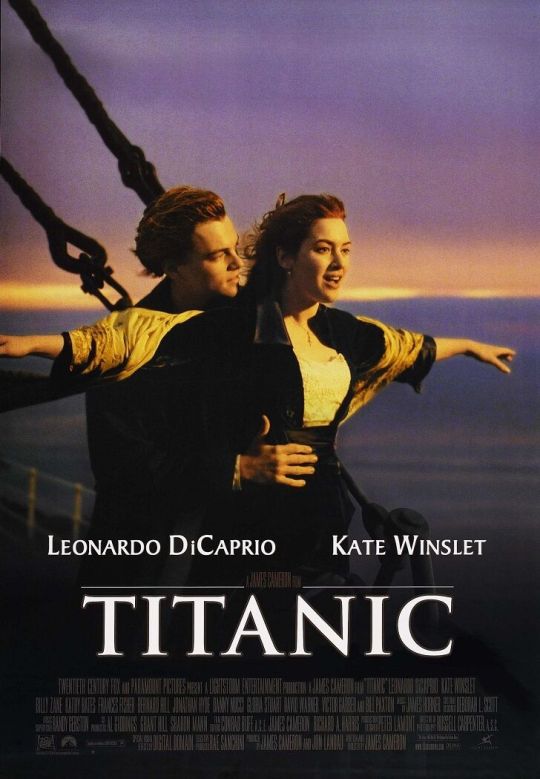
On a lighter note, with respect to historical events throughout the time of both films, in 1989 when Sex, Lies and Videotape was released so was the very first episode of The Simpsons which aired in December 1989 and who didn’t love The Simpsons. Also, in 1999 when Ghost Dog: The Way of the Samurai was released The Titanic movie became the first film to gross a billion US dollars. It made the Guinness World Records. In conclusion both films were very different from one another, Ghost Dog: The Way of the Samurai was categorized as crime/thriller while Sex, Lies and Videotape was categorized as drama/indie film, yet both were produced with smaller budgets while still being profitable and had their own artistic and deeper connections to the characters by the way in which the stories are told. Both were unique, great films to watch regardless of their genre.
5 notes
·
View notes
Text
In honor of May the Fourth, I'm going to rant about something that has been sitting in my brain rent-free for years.
Ok, so, Count Dooku, right? Qui-Gon's master, ex-jedi, dastardly villain, love him to bits, played by one of my favorite actors (RIP Sir Christopher Lee).
As he's introduced to the audience, we get the villain first, with hints that he wasn't always so. Turning from the Jedi and siding with the Sith in order to destroy the Republic, he's almost a twisted mirror to Anakin himself. The problem I have here, is that we never see his pre-villain self! Oh, it's mentioned in passing by Mace Windu, a character the audience isn't exactly primed to trust either, given his attitude in episode one. And then it's mentioned again by Dooku himself, which is entirely undermined by the fact that we just saw him moustache-twirling barely a few minutes ago! As it is, all the audience sees is "this is a dastardly villain, played by The Dastardly Villain Actor, clearly nothing he says can be trusted."
Show-don't-tell is basic narrative construction, so I think his impact as a character, particularly as a sort of proto-Vader, would be much greater if Dooku were introduced in Episode 1, rather than Episode 2. With that in mind, I have envisioned four scenes, two of which have a speaking role for Dooku and are thus notably longer than the original movie scenes, the other two being either one or two lines longer, or having no change in dialogue, only a visual tweak.
Scene 1) Coruscant, the Jedi Temple. After the initial briefing to the council, Obi-Wan argues with Qui-Gon about following the code. Dooku enters the conversation jovially, having come to catch up with his old Padawan. He asks in jest to Obi-Wan why Qui-Gon would ever want to be on the council, after all, speaking from experience, it's a thankless job and lacking in intelligent conversation. He mentions hearing about the Naboo mission. Qui-Gon informs him of the Queen's hopes for intervention from the Senate. Dooku seems skeptical of her success. He remarks that if the Republic keeps failing to protect its systems, they will take matters into their own hands.
What does it accomplish? Dooku is a friendly figure, one that stands with Qui-Gon and reinforces his viewpoint. The scene builds onto Qui-Gon's dissent with the council, and establishes that he is not alone in his opinions. His remarks about Naboo act as both short-term and long-term foreshadowing: short-term for Amidala's decision to kick the Trade Federation out herself, and long-term for the conflict with the Separatist movement which forms the bulk of the plot of the next two movies.
Scene 2) The council has announced that they will not accept Anakin for training. Dooku strides in, as we have established he does not respect the council, and calls them out. What do they plan to do with the boy? Turn him out on the streets of Coruscant? Send him back to slavery on Tatooine? Missing one's family and fearing a new environment are not moral failings. Dooku points out that he himself was old enough to remember his mother, old enough to miss her terribly, and yet he still dedicated himself to the Jedi, became a master, even sat on the council. He pointedly asks Yoda "am I such a disappointment to you?" Several councilors exchange glances. Mace dismisses them from the room.
What does it accomplish? Dooku is established as a voice of reason, and as a mirror to Anakin. He now has a firm connection to Anakin, as an authority figure besides Qui-Gon who has advocated for him. Anakin may even remember him as a major reason for him eventually being accepted for training. Perhaps he remembers this when Dooku cuts off his hand ten years later. Perhaps this event runs through his mind as he holds crossed sabers to Dooku's throat on Grievous's flagship. One more betrayal to drive him over the precipice to the Dark Side.
The next two scenes aren't doing nearly as much heavy lifting, but I think they're still important for setting up the next movie.
Scene 3) Obi-Wan is speaking to Yoda after Qui-Gon's death. He is now adamant that Anakin will be trained as per Qui-Gon's last wishes. He remarks that if the Council won't knight him, then he'll appeal to Dooku to train Anakin. Yoda sighs and says that Anakin will be Obi-Wan's apprentice. He then mournfully admits that Dooku has left the Jedi Order.
What does it accomplish? We see that even though Dooku and Yoda clashed, Yoda was still sad to see him leave. We see that Jedi can leave the Order peacefully. We see that Obi-Wan trusted Dooku enough that he was ready to turn to him for help. This will make Obi-Wan's discovery of Dooku at the head of the Separatist movement into much more of an emotional moment, a gut punch to see the man he trusted betray everything he stood for. Obi-Wan's cold rejection of Dooku in prison is more than just stubborn distrust, it's bitterness.
Scene 4) Qui-Gon's funeral on Naboo. Dooku attends, standing side by side with his former comrades. Even if he has turned his back on the order, Qui-Gon was still his Padawan, and he will pay his last respects. Yoda and Mace discuss the sith. The camera does its ominous pan to Palpatine in the foreground, then shifts focus briefly to the background, where Dooku stands nearby.
This scene mainly serves as setup, establishing a connection between Dooku and Palpatine. Both of these men will be important in later films, and the movie wants you to know it. In character, Dooku is not only saying goodbye to Qui-Gon, he's also saying goodbye to his former life as a Jedi. In a way, it is his funeral as well.
All of these scenes combined mean that when the audience goes to watch episode 2, they are already familiar with Dooku. His first appearance on Geonosis is not one of "oh, hey, Christopher Lee, wonder what kind of dastardly schemes his character will cook up." Instead, we have reactions of either "wait, but we like this guy! He was on Anakin and Qui-Gon's side last movie! What happened?!" Or at least, for the savvier audience, a vindicated "I knew he would turn out to be evil, it's Christopher Lee!" Either way, the investment is already there, so when he dies at the beginning of the next movie, it actually carries some fucking weight. For anyone who didn't watch the 2D animated Clone Wars series, Dooku was introduced at the end of the one movie, and died almost immediately in the next movie. He's a one note aristocratic english villain who's only job is to be an evil bastard and die like a punk. Not exactly compelling, is it? Certainly not worthy of the acting chops of Sir Christopher fucking Lee.
#thinky thoughts#i appreciate the star wars eu#star wars tcw#star wars legends#star wars#can you tell that my favorite clone wars era novel is Yoda: Dark Rendezvous?#flipping fantastic book#excellent characterization for both Yoda and Dooku#delves into the troubled relationship Dooku has with the Jedi#very much establishes him as a proto-Vader#I think I'm gonna go reread it#may the fourth be with you
3 notes
·
View notes
Text
All the Movies I Watched in 2023
This is a very long post so buckle up! (And I'm sorry. I love movies.)
Ticket to Paradise (2022)
5/5. I expected this movie to be a bad cash-grab, but was surprised to find that it had plenty of redeeming qualities. Maybe that's attributable to the charm of Julia Roberts and George Clooney. A lighthearted watch that's enjoyable if you allow yourself to relax and not treat every movie like it has to be a cinematic masterpiece.
Glass Onion: A Knives Out Mystery (2022)
4.5/5. I am so, so ready for a Knives Out, Sherlock Holmes-esque series. This movie was so, so entertaining, and presented a mystery that was different from the first in Knives Out, yet equally enjoyable.
Signs (2002)
4.5/5. Mel Gibson, Rory Culkin, and Joaquin Phoenix are absolutely amazing in this movie. Definitely one of Shyamalan's stronger films, but the ending is weak and doesn't support the weight of the rest of the movie. The concept of combining a tragic backstory for characters in a horror/thriller movie certainly isn't new, and by all accounts this movie could suffice without it, but I think it is a good contribution to its depth and themes. I was watching this in class and when M. Night Shyamalan appeared someone said, with full sincerity, "Who's that random Indian?" 🫥
The Theory of Everything (2014)
4.5/5. I love Eddie Redmayne, and his performance was pretty good. This biopic suffers from the pitfall of refusing to portray their subject as a human (someone who makes good and bad choices), opting instead to paint them as a god-like figure (insisting that they are incredibly moralistic even if it's clear that they aren't), which I think takes away from the intelligence of the film. There's no harm in showing Stephen Hawking as a normal person, and I think more biopics should have a little less bias. Good soundtrack.
Where the Crawdads Sing (2022)
2.5/5. It was fine. It was hard for me to stay invested or care about the characters. Pretty cliche, and didn't have much nuance considering the plot. I think you could live without ever seeing this movie.
Twilight (2008)
2/5. A great movie to play in the background while doing something else. That baseball scene is fantastic though. Romance is bad. I'm pretty sure Carlisle Cullen is Lestat. Alice Cullen's hair is my everything.
Senseless (1998)
2.5/5. This movie is bad, but somehow I can't help but love Marlon Wayans' surprisingly vulnerable performance. He has an effortless charm. David Spade and Matthew Lillard are two of my longtime favorites, and both of them give a solid delivery in their respective typecasts.
Puss in Boots: The Last Wish (2022)
4.5/5. More children's movies should take themselves seriously!!! More children's movies should treat their primary audience with respect and intelligence!!! Children are more intelligent than we give them credit for!!! Thank you to this movie for understanding that. The animation was incredible, such a beautiful watch. I've said this before and I will not be quieted: Puss is Zorro's fursona.
The Lost Boys (1987)
3.5/5. "AAA THEYRE COMING AAAA" I love Keifer Sutherland, and I wish there was more of him in this movie tbh. Kind of boring. I think this could be remedied with more Keifer Sutherland.
Grease (1978)
2/5. I honestly do not get the appeal of this movie. I like Sandy and love Frenchie, but the musical aspect is a little underwhelming and the story is (and I'm sorry) just godawful. I'm referring less to its problematic aspects and more how frustrating it is, misunderstandings and such.
LOTR: The Fellowship of the Ring (2001)
5/5. Peter Jackson Gets It. His love for the book series and the world of Middle Earth is just so evident in this movie's intricacies and imagination, yet it also strays away from the book in ways that I think are really good, such as some of the dialogue choices (Frodo's a little bit meaner in the books, which I don't think would make him very likable if we were actually hearing it be said.) I want to live in Bag End SO BAD.
LOTR: The Two Towers (2002)
5/5. Legolas, my beloved. A bridge between the first and last installments that doesn't feel plot-deprived. Balances perfectly between mounting the tension for the final installment and also maintaining its solitary plot points. I want to include my Letterboxd review because it's ~sO fUnNy~
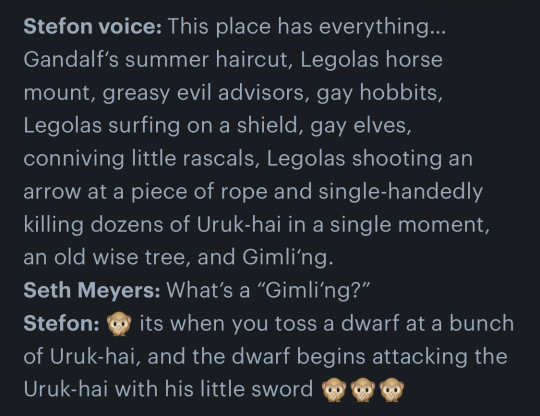
LOTR: The Return of the King (2003)
5/5. Man. Wow. I cry. I cry. I cry. Literally cannot even give a review bc of the overwhelming mixture of emotions I feel when I think about this movie.
The gayest installment of the series, though that's a hard trophy to hold considreing the competition.
A League of Their Own (1992)
5/5. I do not think it is so bad to be a stereotypical underdog sports movie if you can approach the convention with a story as entertaining and genuinely as heartfelt as this. Very funny. Geena Davis!!!!! Geena Davis!!!!!!! Many of these women are lesbians in real life and although that was conveniently left out of the movie... you can still tell. I was scared that the conversation between Geena Davis and Tom Hanks meant a stupid romance subplot was going to happen, but thankfully this movie has too much dignity for that.
Suburban Gothic (2014)
2.5/5. I didn't really enjoy this movie because there wasn't a single strong aspect of it that I could rely on to forgive it. All of the characters were unlikable, the plot was strange and inconsistent (and I was upset because I was looking forward to it in this aspect). However, Jeffrey Combs is his usual amazing self and the humor is pretty good at times.
Fantastic Beasts and Where to Find Them (rewatch) (2016)
3.5/5. I watched this when it came out and it was one of my favorite movies. It still holds a special place in my heart for the surprising breach of conventions it makes. Newt, as a leading man in a big-budget film, is shy, sensitive, and polite. I love him to death. (This is the movie that started my love for Eddie Redmayne) However, considering that it is a big-budget blockbuster, it's only allowed to go so far with its breach of conventions.
It's very beautiful to watch. The romance between Newt and Tina actually feels like a romance, which I find is surprisingly hard for movies to do. It's also the strongest installment in the series, and it goes downhill from there.
Fantastic Beasts: The Crimes of Grindelwald (rewatch) (2018)
3/5. I wanted to like this movie so bad when I first watched it, and I do, sort of. I love everything in this movie that replicates the last movie: Newt's characterization, Tina's characterization, the visual effects, the beasts!!!!!, the time period, the worldbuilding, the sophisticated air. I also love the addition of Newt's brother and Yusuf Kama (William Nadylam is just incredible!). And that's where my love for this movie ends. Everything else annoys me. Like, I understand that Queenie loves Jacob so much she'd do anything for him, but I find it hard to believe she'd be convinced by Grindelwald. She's smarter than that. And, I don't really care about the Dumbledore, Lestrange, and Credence Barebone/Nagini storyline. They just aren't that captivating. This is where the series starts to tip from an equal balance between the beasts and 1920s Wizarding World Politics into more WW Politics, which makes me sad.
Fantastic Beasts:The Secrets of Dumbledore (2022)
2/5. This movie makes me so fucking mad. Out of all the movies in the series, this one is the worst. It's not even about Newt Scamander anymore! If you wanted to make a Dumbledore/Grindelwald origin story, just make a separate movie series! I wanted to see beasts! I wanted to see Newt travel the world! Goddamn this movie for taking that away from me, and every other Scamander fan!!!! The last shot of this movie is of fucking Albus Dumbledore, for christ's sake!!! I just don't care!!! Fuck this!!! WHY.
I'm actually so sad.
(J. K. Rowling can't write for shit and she's a TERF. Neil Gaiman can write for shit and is a trans ally. Coincedence? I think not.)
I think Mads Mikkelsen is great as Grindelwald. He delivers a sophisticated and somewhat sinister performance to this movie that I think does more service to it than Johnny Depp's campiness, which isn't really right for this type of movie. If the stars had aligned differently, I would have liked Mikkelsen to play Grindelwald from the start. But not even that could have saved this shit movie.
The Power of the Dog (2021)
5/5. Beautiful and visually captivating. Very nuanced plot that I will not pretend to understand in its entirety, though I'm sure a rewatch would do it justice in that regard. This is not a movie you want spoiled, so look it up with caution. Jane Campion? More like Jane CHAMPION. Definitely recommend.
The Hobbit: An Unexpected Journey (2012)
4/5. Maybe a controversial take, but I actually really enjoyed this movie, as someone who hasn't read the book. Maybe I would enjoy it less so if I did read the book, (which I do eventually plan on doing) and I understand people's complaints about the movie. I don't think this movie (and the Hobbit series as a whole) should be considered with the same judgment as the LOTR series: despite being made by the same director, their appeal and intended demographic is vastly different. While LOTR's appeal was more based on its faithfulness to the books and authenticity, and intended demographic is more longtime LOTR/fantasy fans (nerds), the Hobbit trilogy's intended appeal is more of a meatheaded likability intended to appease more widespread audiences (everyone who's not a nerd). I don't think it lives up to LOTR, and I do think a singular movie should have been made more in the vein of LOTR (faithfulness to source material and avoidance of blockbuster stereotypes), but this movie is still fun. The performances are good and overall I can't hate this movie.
The Hobbit: The Desolation of Smaug (2013)
4/5. This is probably my favorite in the Hobbit series. The romance between Kili and Tauriel is pretty solid. Bard is fantabulous. Smaug is an absolutely terrifying villain. Bilbo is a Chad. The story never feels stretched out or annoying. I dunno, I just like it. :)
The Hobbit: The Battle of the Five Armies (2014)
4.5/5. Again, I don't expect anybody to agree with my opinions on the Hobbit trilogy. I just find them fun. This one is heartbreaking. But still fun!
Mikey and Nicky (1976)
3.5/5. Very interesting to watch this as a Columbo fan.
I expected this movie to be kind of boring, and while there are some slow bits, it's very entertaining throughout. The tension simmers on the back burner for almost the entire movie until the end, when it boils over and everything catches on fire. I think it's good that there are moments where the tension takes a backseat to let some of the other themes develop, particularly regarding the character development and relationship between Mikey and Nicky. I also love this movie's concept. Def recommend.
Pirates of the Caribbean: The Curse of the Black Pearl (2003)
4/5. I didn't expect too much from this movie, and found that it was good. Very entertaining. Johnny Depp is wonderful as Jack Sparrow (this is the type of movie where his campiness is appreciated). I love pirates. I'm so annoyed about the "You like pain? Try wearing a corset." Line sm. Like... they're called stays in that time period, for one thing. Secondly, they shouldn't hurt if you're wearing them properly. Like my god that line was so written-by-a-man it hurts. Orlando Bloom and Kiera Knightley were great. Fun.
Spiderman: Across the Spider-Verse (2023)
5/5. If people have told you to watch this movie, go watch this movie. If people haven't told you to go watch it, I'm telling you right now. Animation is gorgeous and it maintains and elevates all the appeal of the first movie. The diversity just exists in this movie, because this movie understands that diverse people just exist. PLEASE go watch it.
Bridesmaids (2011)
4.5/5. This is a movie for the girls who are morally grey and fear they may be a bad person and are just trying their best to trudge through a burned out existence. Emotional aspect is just as strong as the comedic aspect, and they transition in and out of each other really well. Just... skip the bridal dress scene.
Bill & Ted's Excellent Adventure (1989)
5/5. One of the most entertaining and lovable movies I've ever seen. A good watch for when you need to clear your head and just relax.
In the Heat of the Night (1967)
5/5. Intelligent and revolutionary-for-its-time movie that still has modern relevance. Sidney Poitier deserved an Oscar for this, and I'm really sad he didn't get one. (However he did get a British Academy Award for this movie.) Love the concept, though I do wish the racial aspect had been carried through to the end, as it kind of drops off in favor of the murder-mystery aspect, culminating in a resolution that's essentially just "I guess I'm not racist anymore because you're really good at solving crimes." I think Virgil deserved a better end to his story.
Rango (2011)
5/5. This is one of those rare children's movies that feels older, mostly because it takes itself seriously and delivers on that 100%. Animation is wonderful.
War of the Worlds (2005)
3/5. It's sort of fun, but so annoying and underwhelming that it's not even worth it. Tom Cruise's character is supposed to develop but we never really see that. Dakota Fanning screams so much. I was pretty scream-y when I was a little girl, but not even I screamed that much.
Pride & Prejudice (2005)
4.5/5. Maybe I do believe in love.
I think this is like the Hobbit trilogy version of book adaptations: not totally faithful to source material but pretty enjoyable. Had me sobbing.
I always get a little annoyed when period pieces feel like they have to sacrifice historical accuracy in costuming and customs in favor of appealing to a modern audience because I think audiences are smarter and more open-minded than they give us credit for.
Stand by Me (1986)
4/5. Even though this isn't really horror, you can definitely tell it's a Stephen King movie: self-insert writer character, set in the pacific northwest or northern east coast, gratuitous 1950s-ness, psychopath bully, and bad parents.
This movie has so much heart behind it. It's such a genuine and heavy portrayal of boyhood and the emotional topsy-turviness of male adolescence. I can't say female adolescence because there's hardly any women in this movie at all. I think it's fine if it's a boyhood-centric movie (but when did boyhood mean that women don't exist?) but it is by no means a commentary on adolescence as a whole.
Clue (rewatch) (1985)
4.5/5. Witty humor and a well-crafted mystery. Very fun, even if it falls short in some of its intended appeal. You know what never falls short? Tim Curry.
Batman Begins (2005)
3.5/5. My least favorite installment in the Dark Knight trilogy. Just not as appealing as the other two in terms of tone and storytelling ability.
The Dark Knight (2008)
4.5/5. My FAVORITE installment in the trilogy. What can I say about this that hasn't already been said before? I'll tell you: YEAAHHH GARY OLDMAN!! I LOVE GARY OLDMAN!!!!
This movie is THE quintessential neo-noir movie.
The Dark Knight Rises (2012)
4/5. Again, what can I say that hasn't already been said before?
SPOILERS: I'm so glad Gary Oldman didn't die because I was almost certain he was going to. Also I love when Batman reveals his identity to Gordon by quoting what Gordon said to him when he was a kid, and of COURSE Gordon realizes because that's just the amazing person he is.
Apostle (2018)
4.5/5. I get that not everybody thinks this movie is good, but I can't help but love it. I think part of it is that it holds a lot of personal appeal (that being Michael Sheen, in case my 10,000 Good Omens posts didn't allude to that).
Here's a list of stuff I liked:
Michael Sheen
Dan Stevens (Now I know he'll never leave me.)
The solid romance subplot.
Michael Sheen
Religious symbolism.
Cults.
Solid historical accuracy in terms of clothing.
I liked this movie up until the very end, where it kinda feels underwhelming. I didn't like the supernatural aspect, which kind of undercut the themes of the movie.
1917 (2019)
5/5. I made a whole slide presentation on why this movie is amazing so I think I'll just link it here.
If you don't want to read all of that, just know that this movie is, a) incredible with historical costuming, b) an effective anti-war film, c) soundtrack is wonderful, d) it will rip your heart out and you will like it. You will like it.
Young Guns (rewatch) (1988)
3/5. A classic slightly-historically-accurate cowboy movie of the eighties. Keifer Sutherland :). Kinda gay. It's a bit boring and forgettable, and the romance aspect isn't that good. If I ever gave it another rewatch, I think I would just turn it off after Billy shoots that traitor, turn it back on for the peyote scene for a laugh, and then turn it off again.
Master and Commander (2003)
4.5/5. My rating may lead you to believe that I like this movie somewhat, but not very much. However, I love this movie so much I can hardly put it into words. There's just something about it. I didn't know I was starving until this movie fed me, to be dramatic. I love how precise it is with historical accuracy. I love the characters. I love the strings duet. I love James D'Arcy. I love Paul Bettany and his flightless birds (GOD I love him in this movie. Doctor characters in period pieces are always my favorites). I love bros. I want to live in this movie, it's so cozy. I want to be a sailor for the British Royal Navy in 1812 so damn bad.
I would recommend this movie. It happens to fit in a personal niche of mine, so I think it's the greatest thing ever, but I understand that not everybody has that same niche lol.
Pride and Prejudice (1995)
5/5. Maybe an unpopular opinion, but I prefer this miniseries to the 2005 movie. Maybe it's just because of its intense historical accuracy and closer allegiance to the book (if 2005 is the Hobbit trilogy of P&P adaptations, this is the LOTR trilogy), but this series really makes the book come to life. I think it's mostly because it has way more time to tell the story. Jennifer Elhe is so good as Elizabeth: her sly glances and clever deliveries have made me, a straight girl, fall hopelessly in love with her. Colin Firth falls in love. Just look:

I can't breathe. Look at him.
Damn this series is good. Definitely recommend 100000000%.
Surf's Up (2007)
4.5/5. So damn funny. A good story about penguins surfing to Green Day. A fun relaxer.
It's a Wonderful Life (1946)
4.5/5. A Christmas classic that I had never seen before. It has charm. It has a Good Omens reference 44 years before it was published ("angel" being confused to mean something gay)
Off Track (Ur Spår)
3.5/5. A Hallmark-y Swedish drama-comedy about an alcoholic single mother who is trying to turn her life around for her daughter, her ex-husband and his new wife, her brother (an amateur athlete training to compete in the Vasa race--a cross-country skiing competition), and his issues with his wife and their inability to conceive. It's not the greatest movie ever made, but what it does have is heaps of heart. Lisa is a character with so much determination, and it's incredibly satisfying when (spoiler) she crosses the finish line--the final person to do so--and she is given a celebratory wreath and the announcer calls her the true hero of the race. I cried. She's been at the bottom of the rank with every chance to turn back, but she endures, just as she does in life. Love her. Her brother on the other hand is sorta scummy and remains scummy throughout the entire movie. It's very easy to not root for him because his arc never really has a resolution. Klara deserves better.
Man of Steel
3.5/5. It's enjoyable. Henry Cavill is perfectly cast as Superman. Love how much of a sweet country boy he is. I kinda hate the way Lois Lane is written, but at the same time she has her moments.
Final Thoughts: I've watched a lot of really popular, big-budget blockbuster movies this year (e.g. LOTR series, Dark Knight series, Pirates of the Caribbean, etc.). In the past I would have avoided movies like these because I always assume that I won't enjoy these types of movies. However, I think this year I was less over-assumptive and was able to sit back and enjoy movies without expecting every single movie to be the greatest thing I've ever seen.
I watched a lot of "dudebro" and male-centric movies in 2023, and though I enjoyed a good number of them, I'd like to watch more movies that are female-centric/feminist/have a good portrayal of women in 2024. I think I enjoyed male-centric movies like Master and Commander because of their nuanced characterization, mostly stemming from the fact that they were written by men and about men. (I don't think it's a bad thing to enjoy movies that celebrate masculinity, like Master and Commander, as long as it's not misogynistic in its celebration.) Some of the movies I watched that feature women are written by men, and therefore the women were underdeveloped and fall into the misogynistic storytelling pitfalls that portray women as stereotypes (whether conscious or not), which is why I'd like to see more movies written by women and about women, to see an honest and nuanced portrayal of women.
#tricia’s 2023 at a glance#knives out#glass onion#george clooney#daniel craig#julia roberts#signs#mel gibson#joaquin phoenix#m night shyamalan#eddie redmayne#the theory of everything#daisy edgar jones#where the crawdads sing#twilight#kristen stewart#robert pattinson#marlon wayans#david spade#matthew lillard#puss in boots#puss in boots the last wish#the lost boys#keifer sutherland#grease#lord of the rings#lotr#lotr trilogy#peter jackson#elijah wood
4 notes
·
View notes